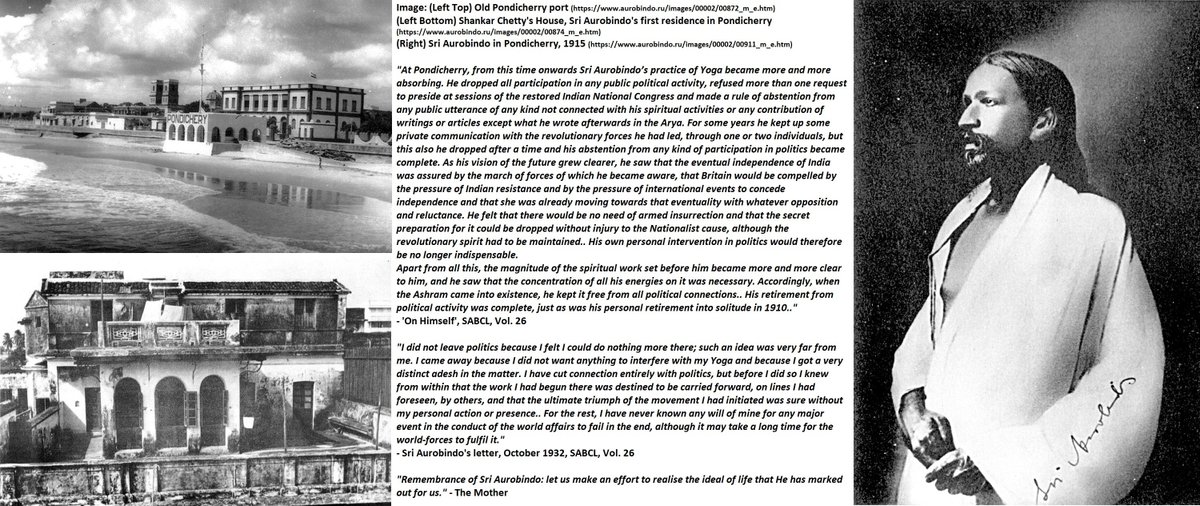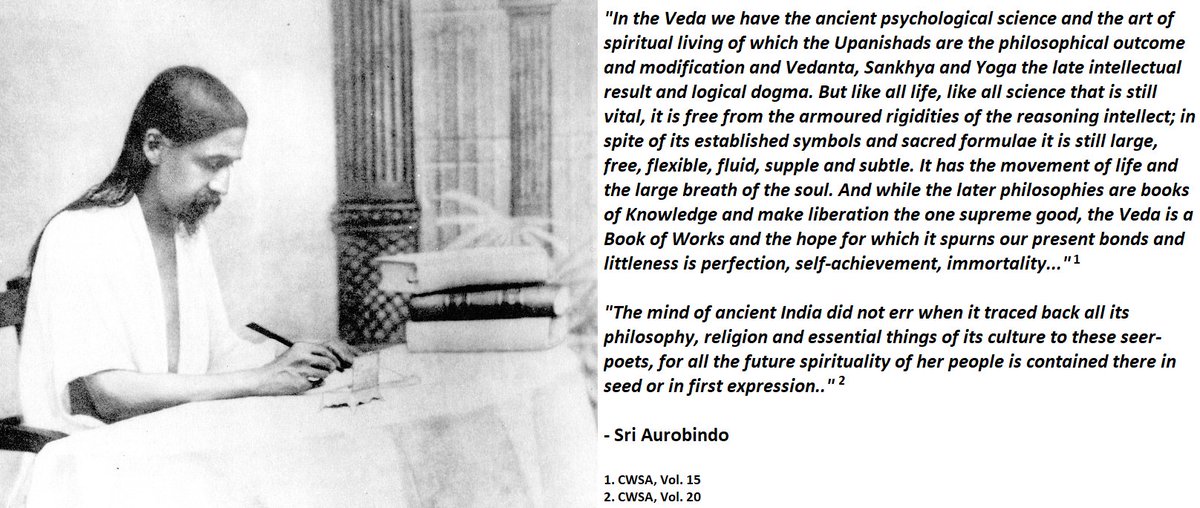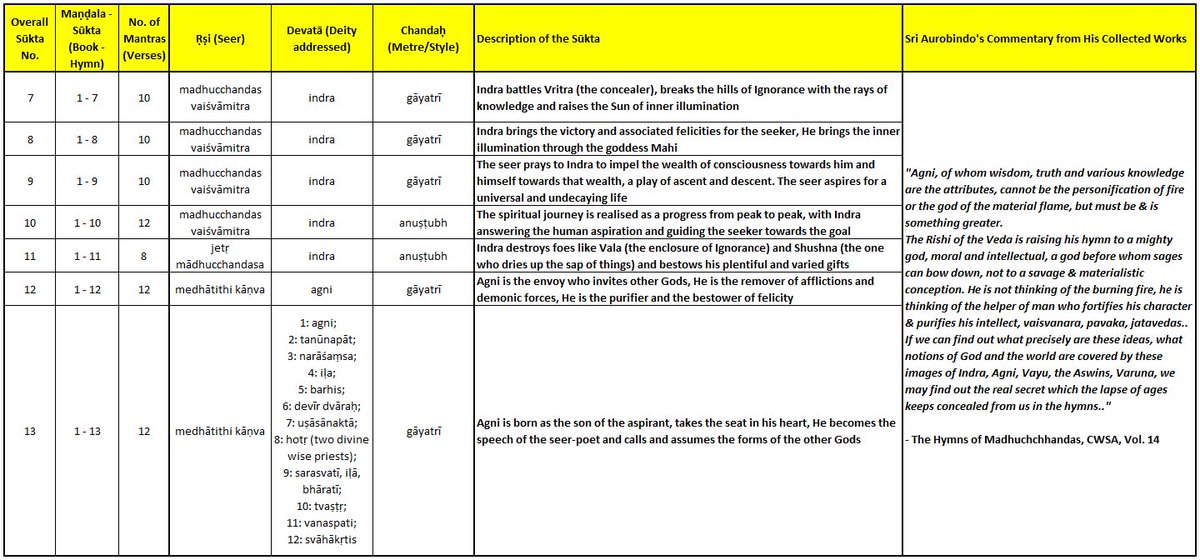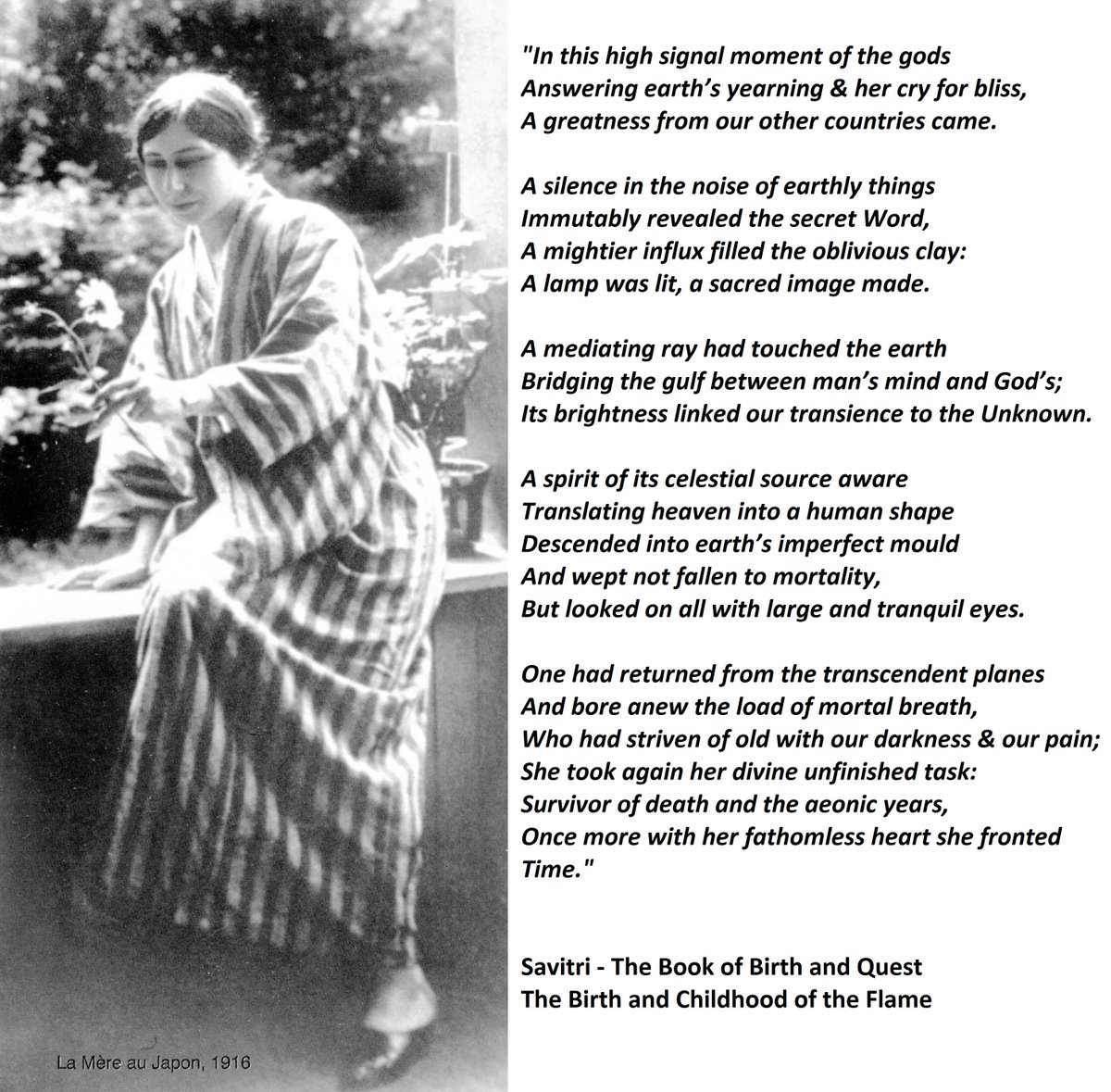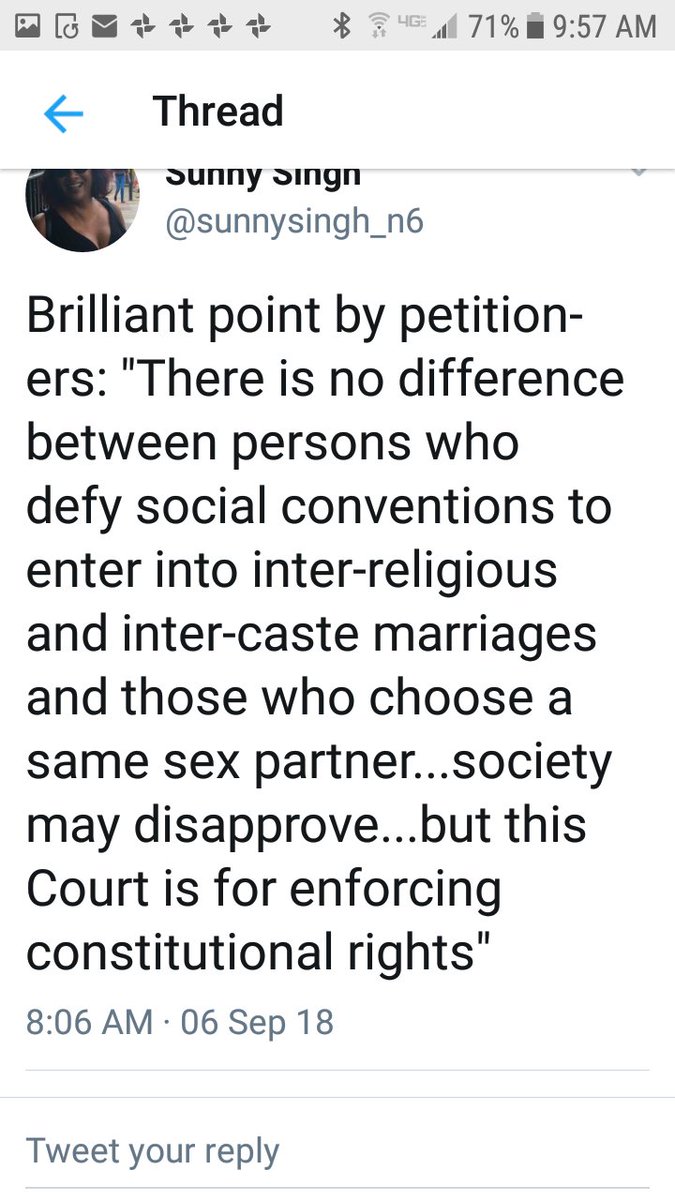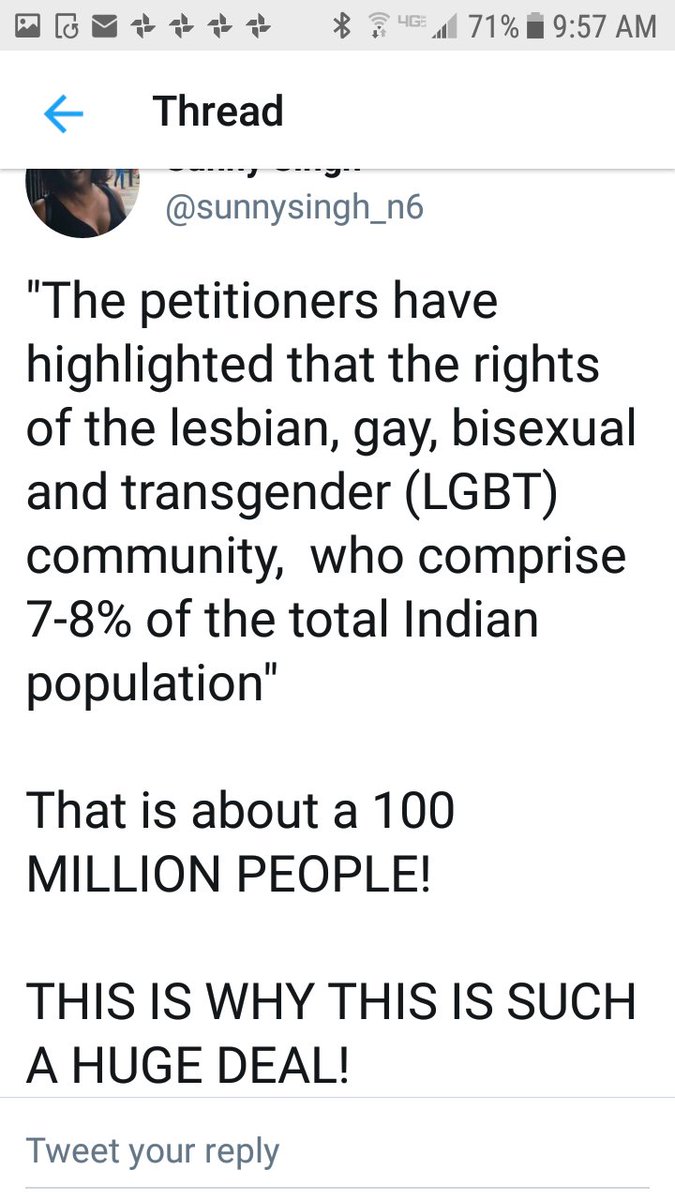Let us try to follow his journey throughout India, until his final stop in Pondicherry after ~17 years..
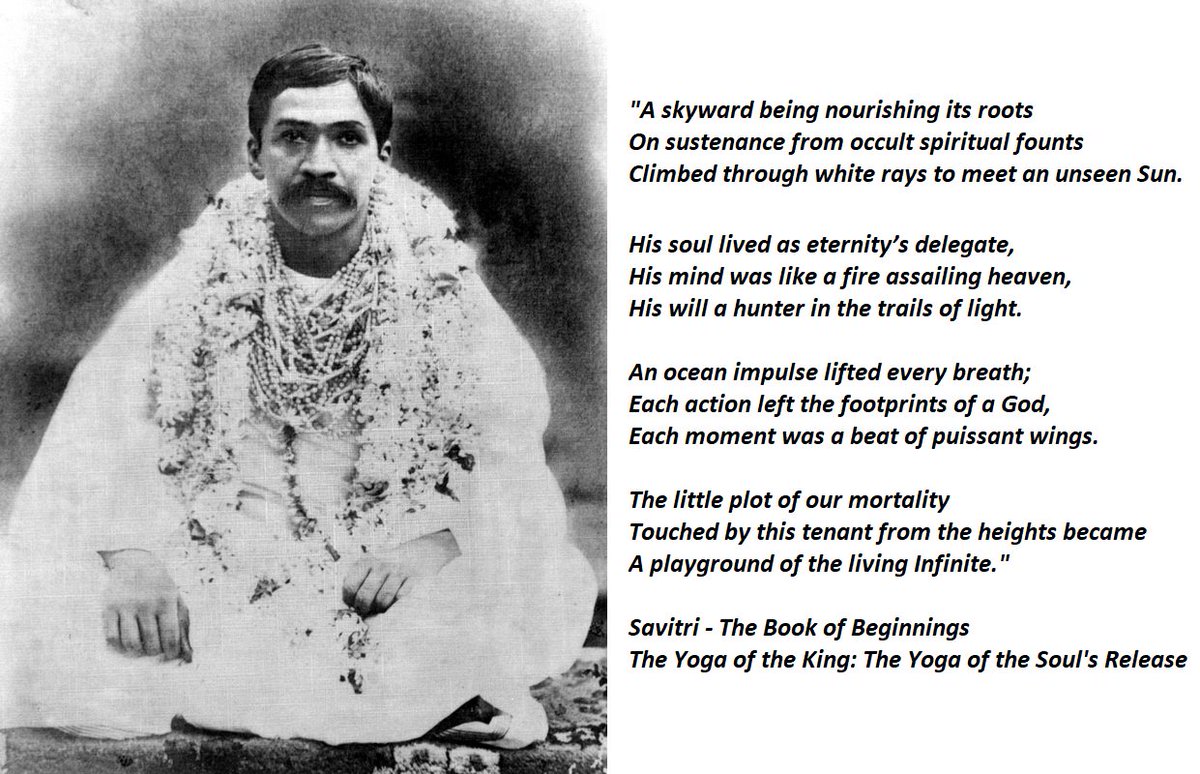
#SriAurobindo's ship arrived at Apollo Bunder, Bombay.
(Carthage, route taken --> London – Gibraltar – Port Said – Aden – Bombay)
After a long absence of ~14 years. Mother India welcomed Him with a vast calm..
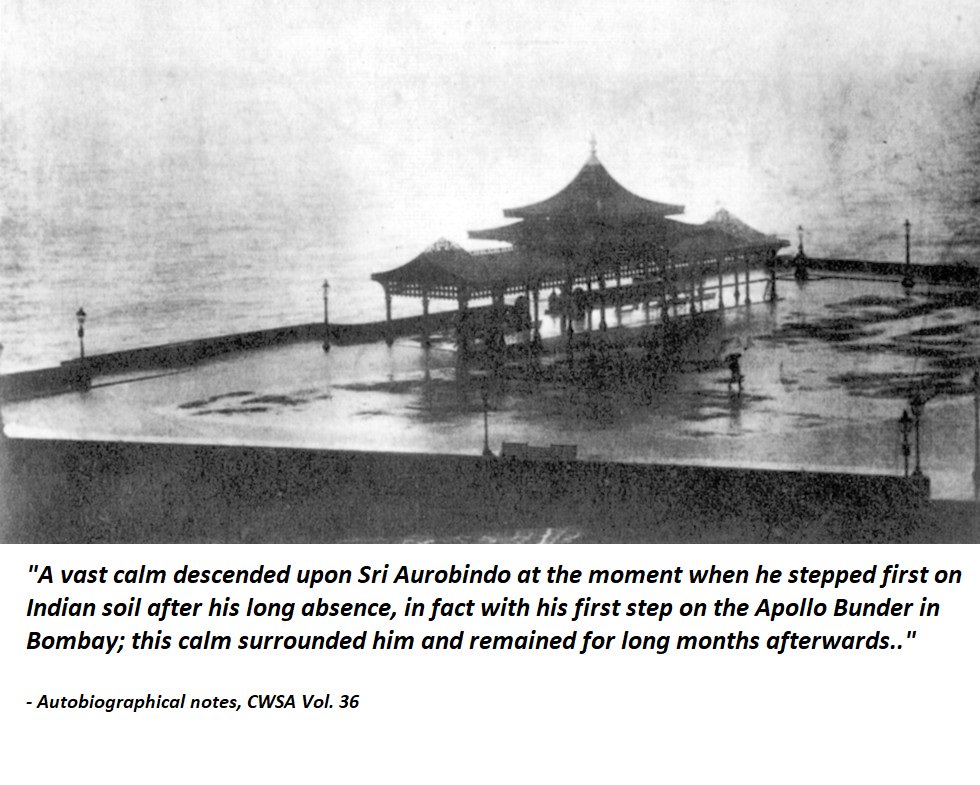
#SriAurobindo arrived in Baroda on 8th Feb 1893, & reported to work on 18th
(Land Settlement Dept, Monthly salary of Rs.200)
Impressed with him, the Maharaja later employed him in the Secretariat
A remarkable incident happened during his 1st year of stay:
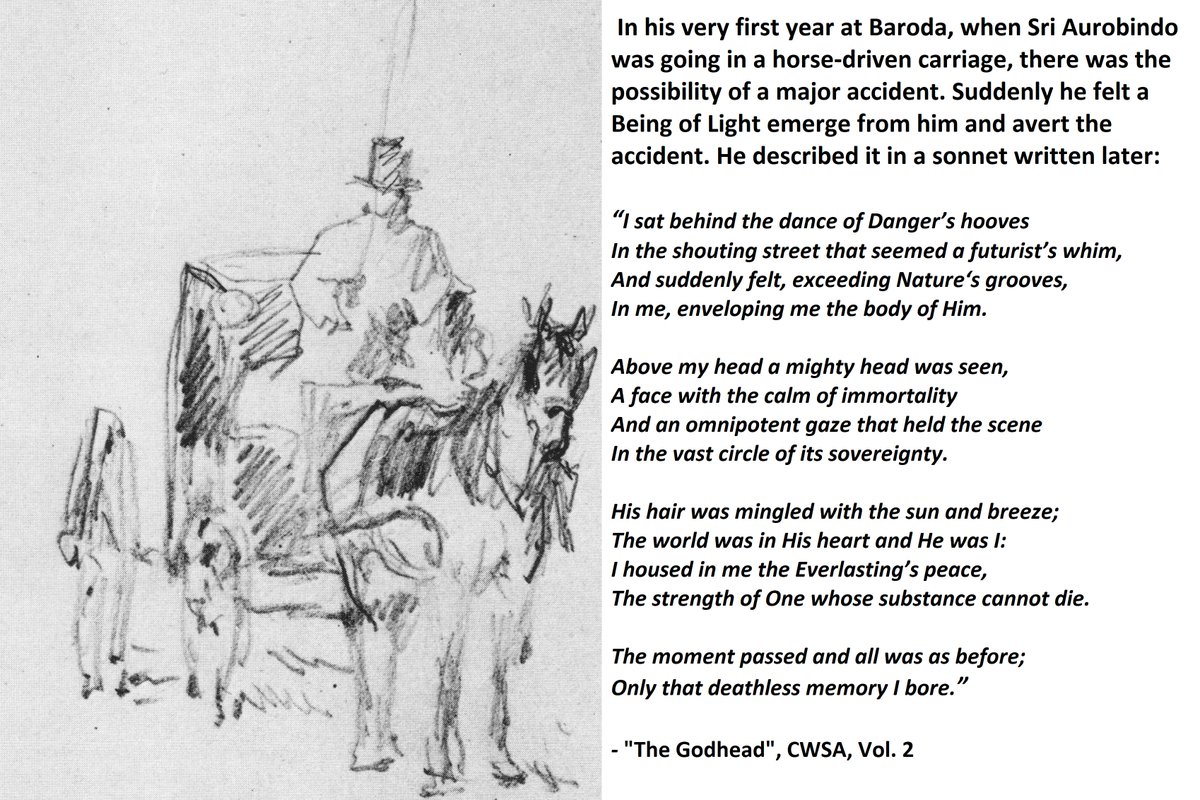
After a long absence, #SriAurobindo had to meet his family, & went out ~ Jan.1894, travelling to Ajmer (met Benoybhusan) & Deogharh (met larger family)
Here is how the family members & Sri Aurobindo would later describe their meeting..
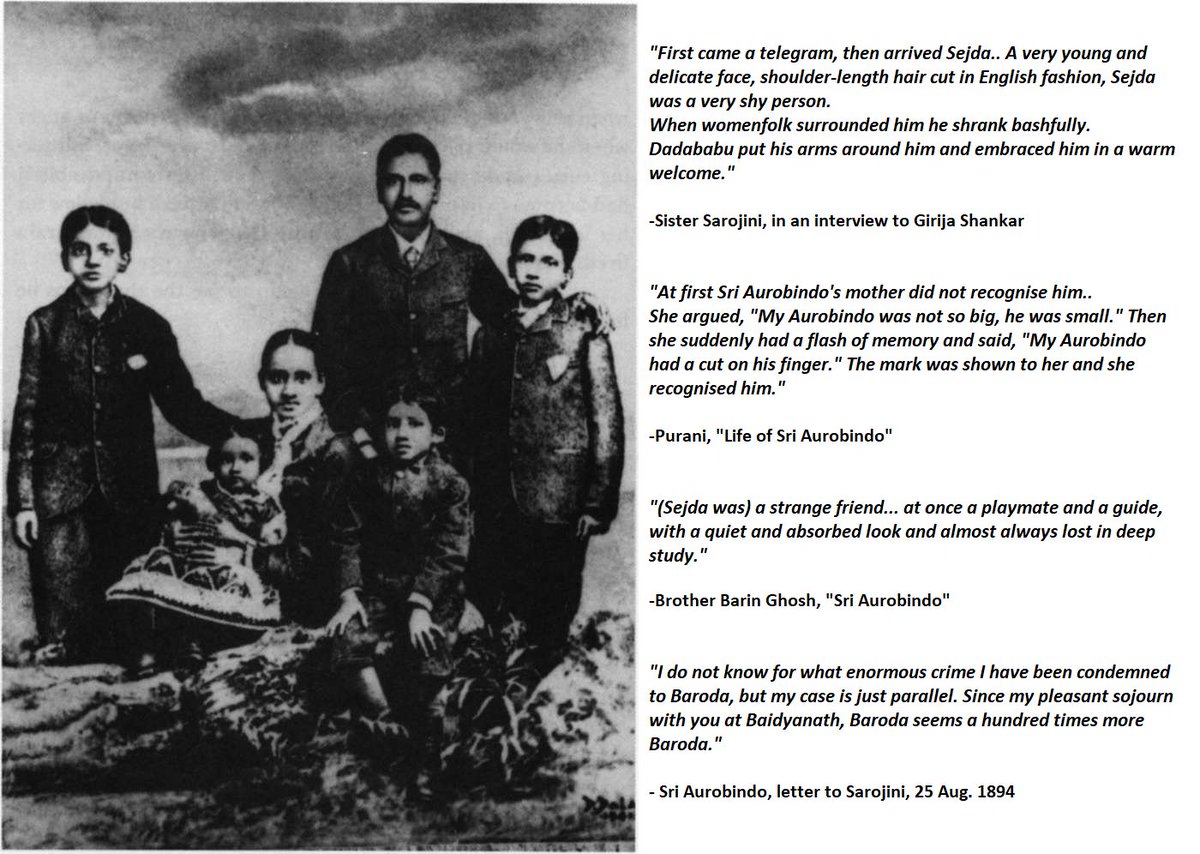
V.S. Bapat, an officer in the Baroda survey settlement dept., was indicted for corruption in ~1894.
Gaekwar, who was in Ooty, called #SriAurobindo there to prepare a precis of the case.
Bapat had for his help another distinguished gentleman:
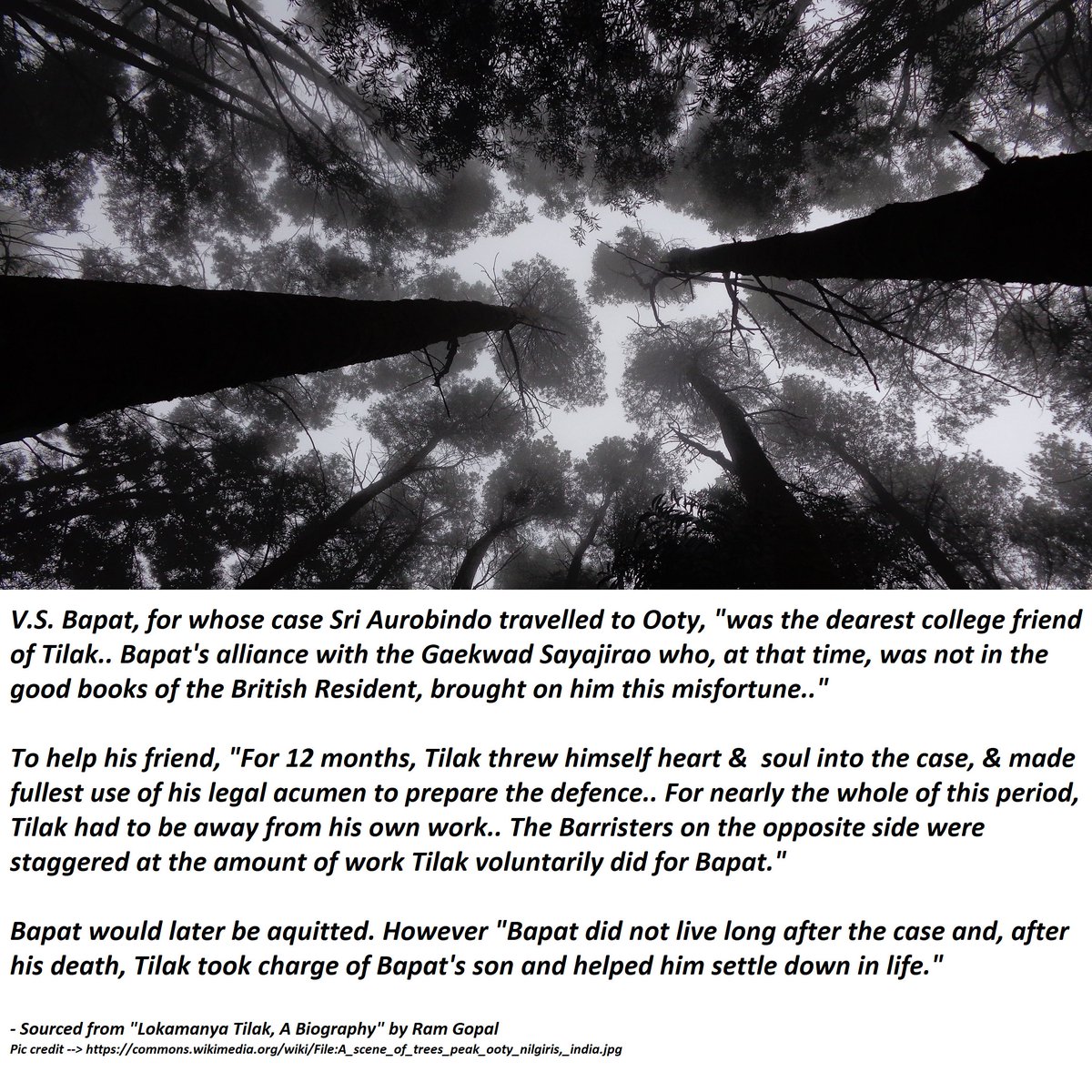
#SriAurobindo was not interested in admin., so he entered Baroda College , 1st as a part time lecturer in French (1897), then as a regular Prof. of English (1900) & finally appointed Vice-Principal (1904)
Some interesting reminiscences of the period:
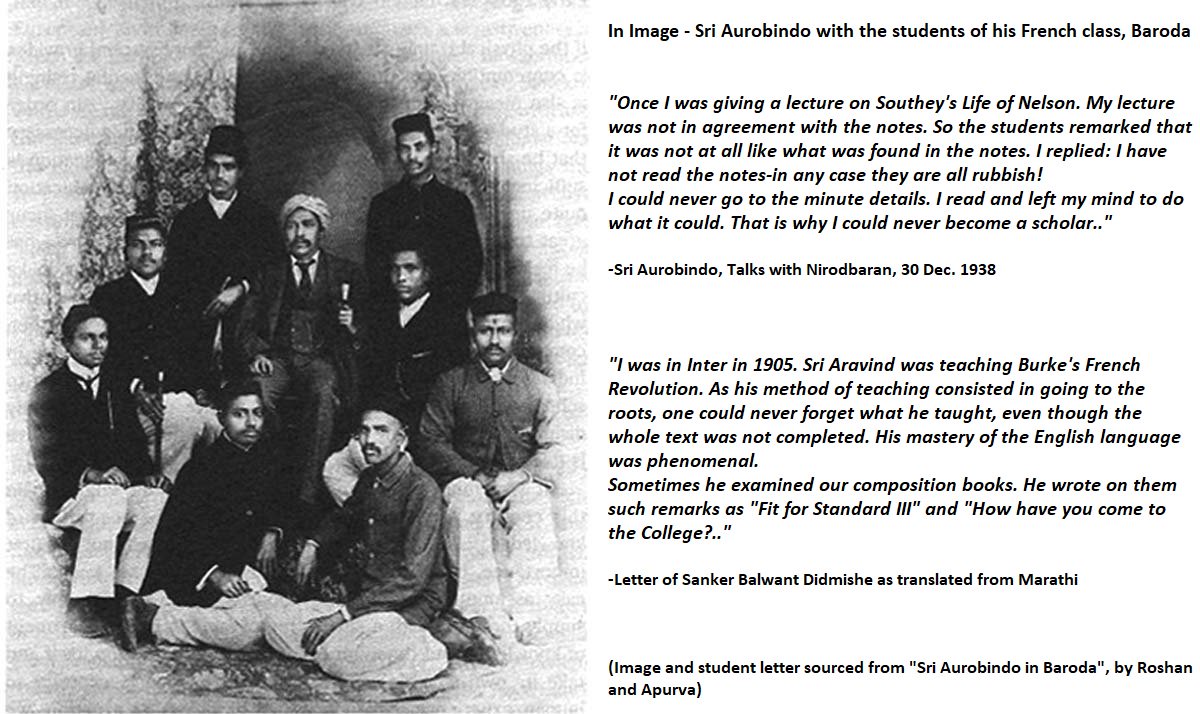
During his teaching period, #SriAurobindo used to pass his vacations in Bengal, generally during the Puja holidays — visiting his relatives and joining the festivities..
"Auro-dada's" wit and humour used to amaze people even then!
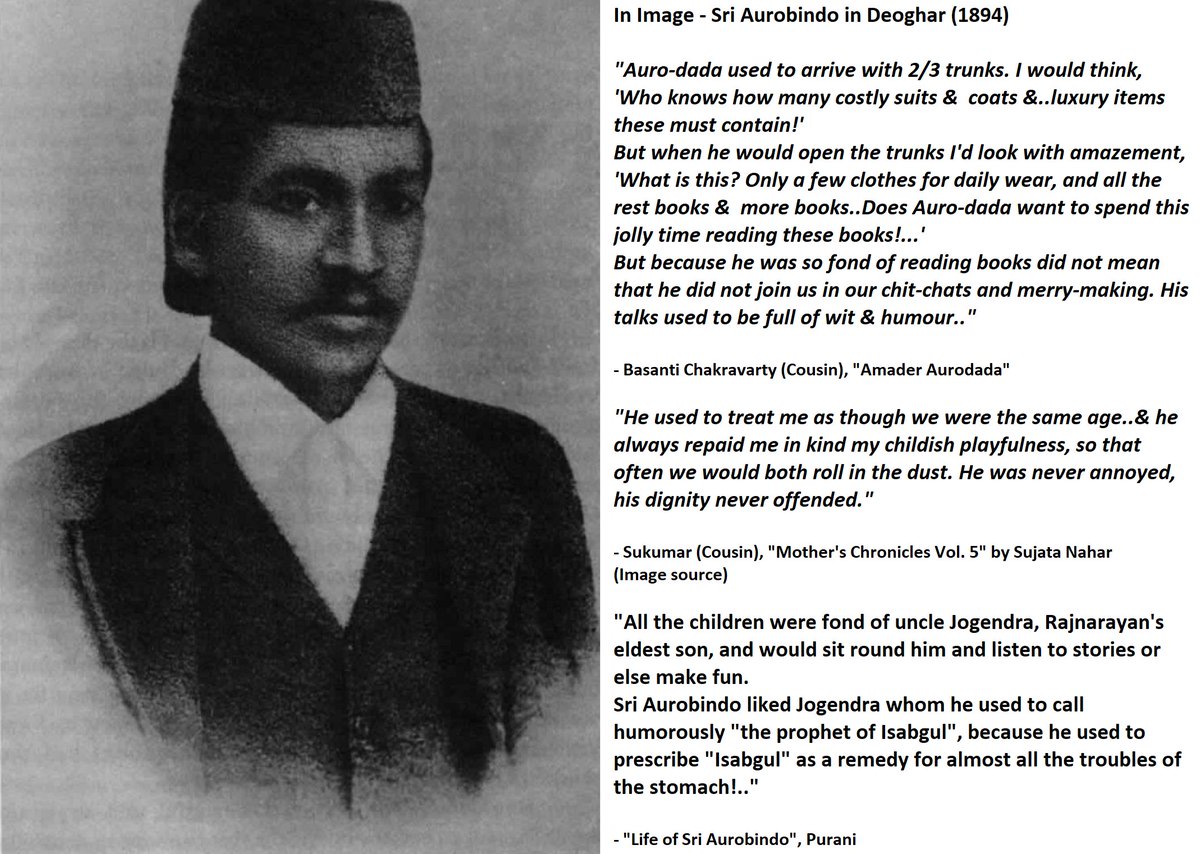
Jatin Banerjee came to Baroda for military training in ~1898. Once ready, he was sent to Bengal by #SriAurobindo for revolutionary work
This political decision wasn't sudden, Sri Aurobindo's intimacy with India had been growing over the years:
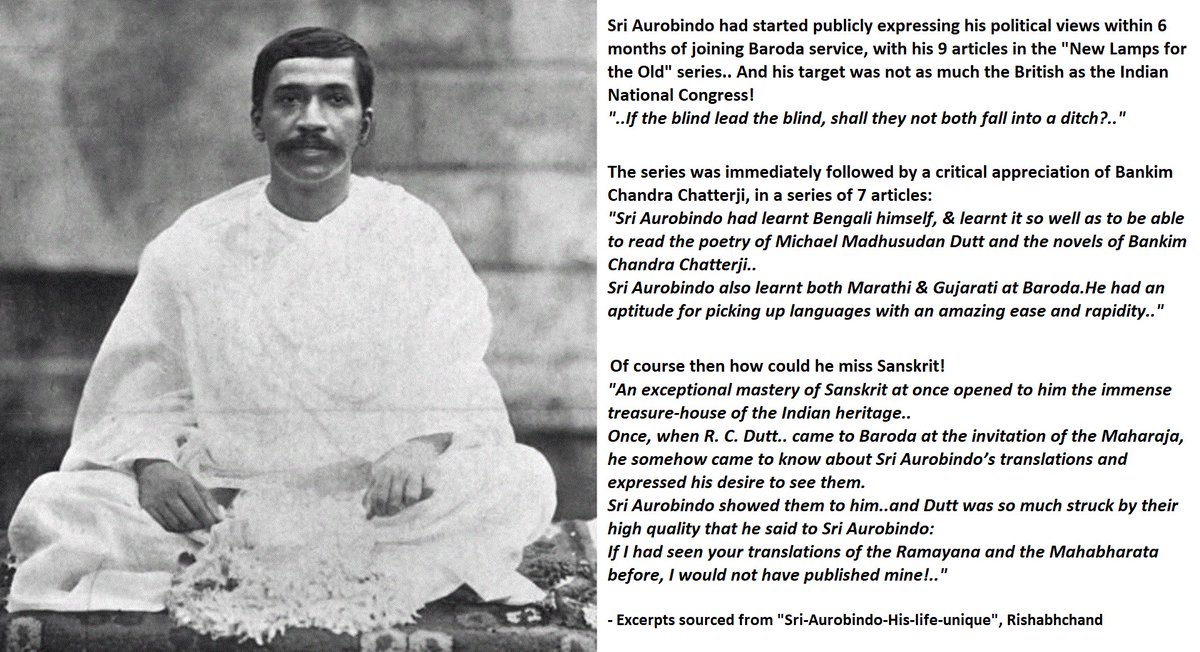
~1900, #SriAurobindo was turning 28 & wanted to get married. So he advertised in Calcutta papers for a bride. And within a year, he found the match..
Interestingly the name of the Bengali girl he selected & His own name, both mean 'Lotus'!
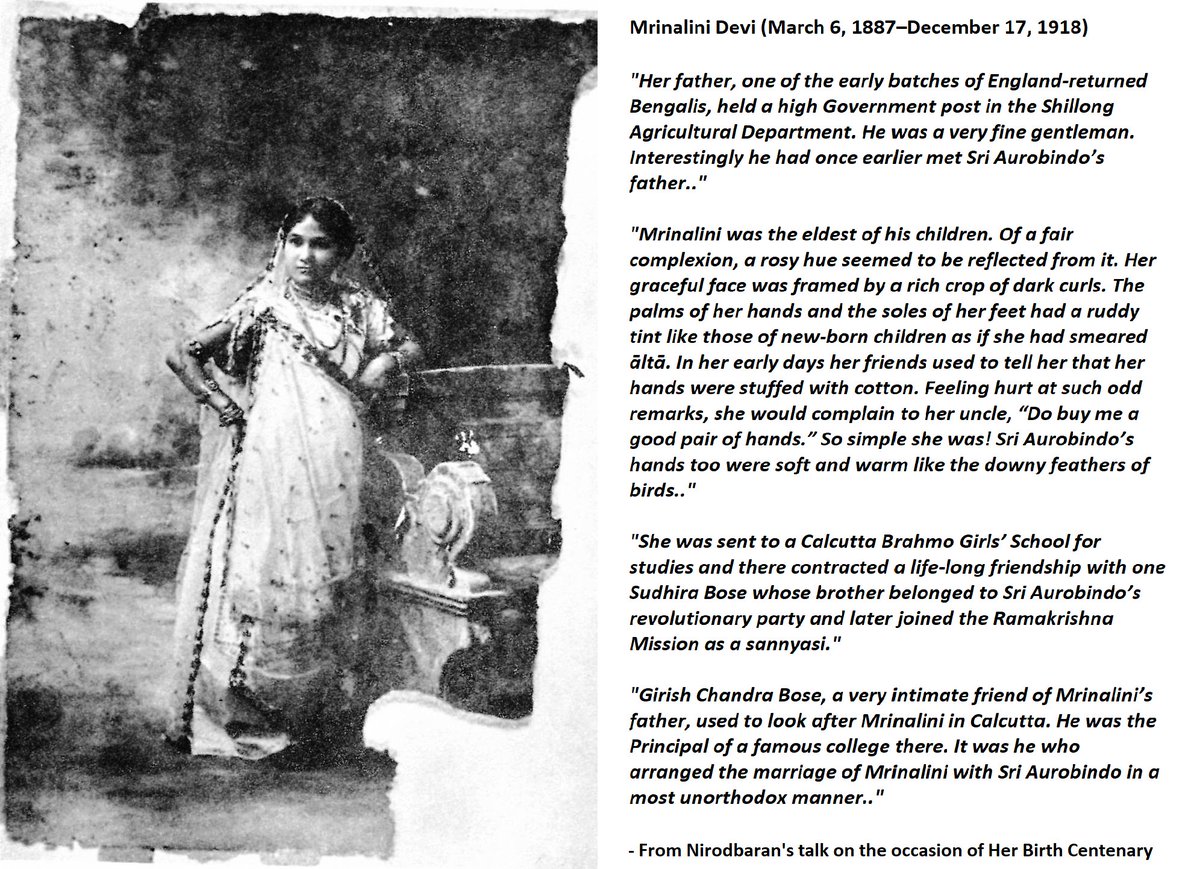
#SriAurobindo got married to Mrinalini on 30 Apr,1901 acc. to Hindu rites. The function was attended by famous scientist J.C. Bose, Lord Sinha, barrister Byomkesh Chakravarty etc
Of course Sri Aurobindo's marriage couldn't have been purely conventional:
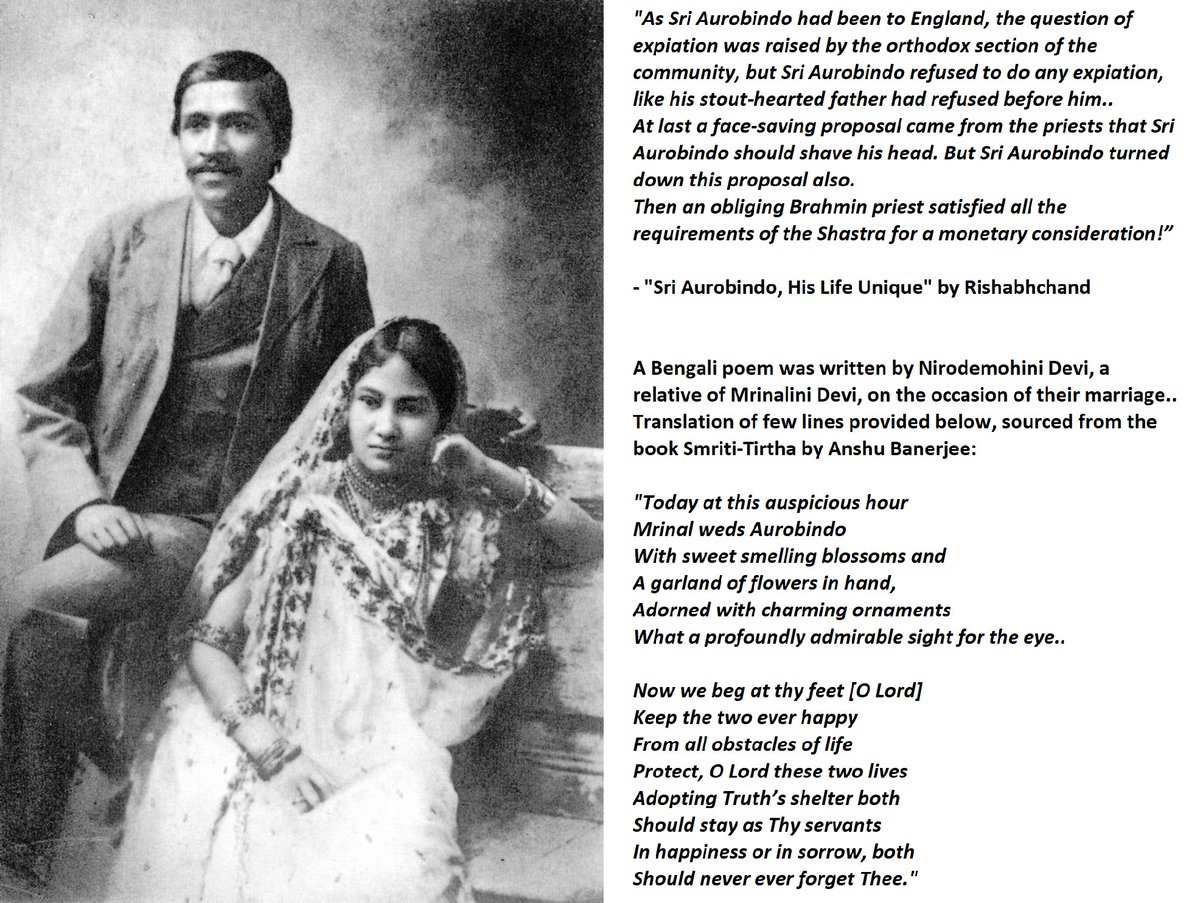
After his marriage (1901), #SriAurobindo went to Deoghar & from there traveled to Nainital with His wife Mrinalini & His sister Sarojini. They reached their destination ~ 28th May, 1901.
We can have a brief glimpse of His experience there from this letter:
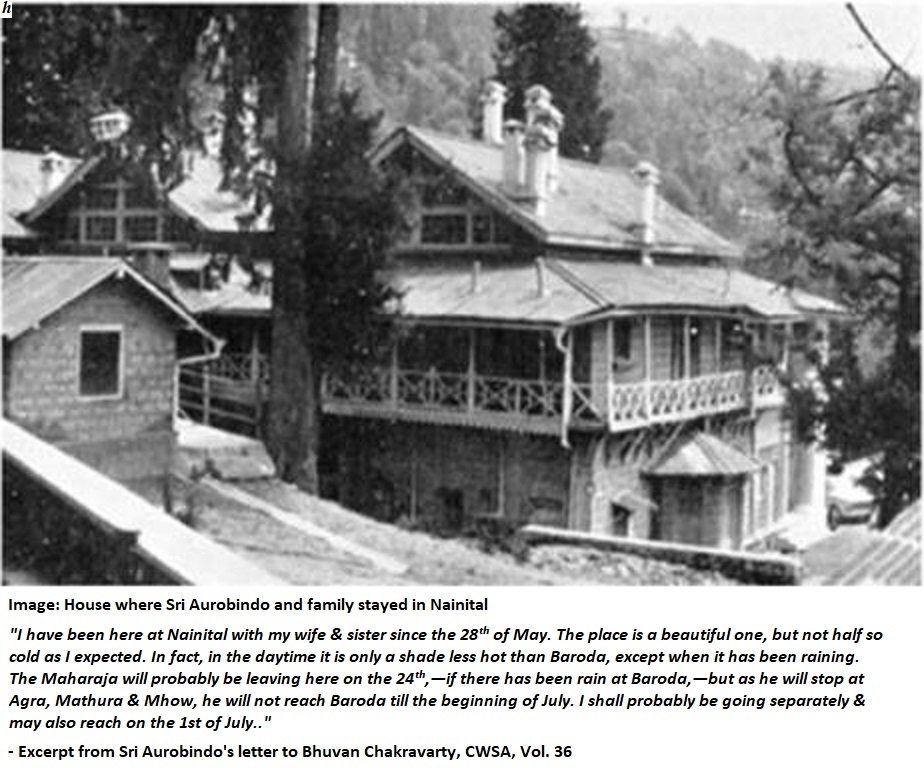
#SriAurobindo returned to Baroda in Jul-1901 with His wife & sister. He had asked his friend Madhavrao Jadhav to furnish a rented house for their arrival.
Sri Aurobindo had developed a circle of friends in Baroda, let's take a look at the Jadhavs 1st:
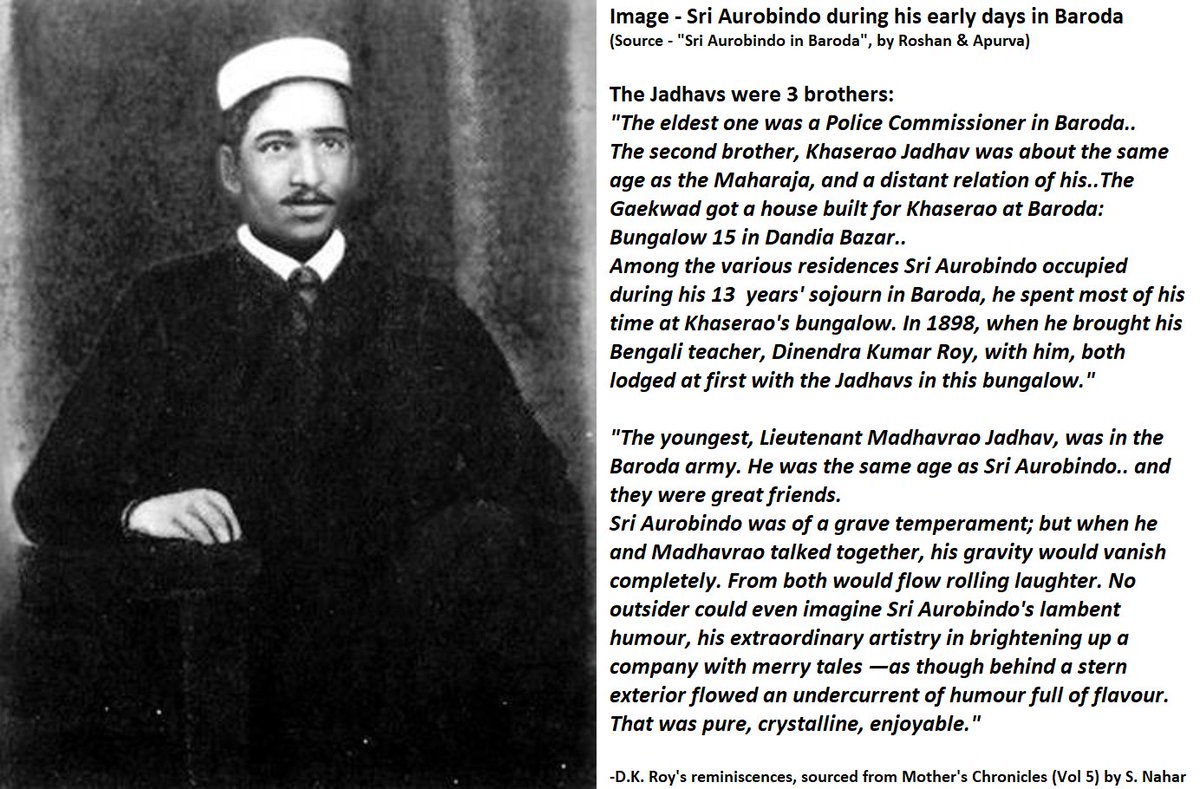
~Late 1898, #SriAurobindo enrolled the services of D.K. Roy to improve his Bengali. They traveled from Deoghar to Baroda via Bankipore (Patna) & Bombay
D.K. Roy would stay with Him for next ~2 years, that'd prove to be a rich source of reminiscences:
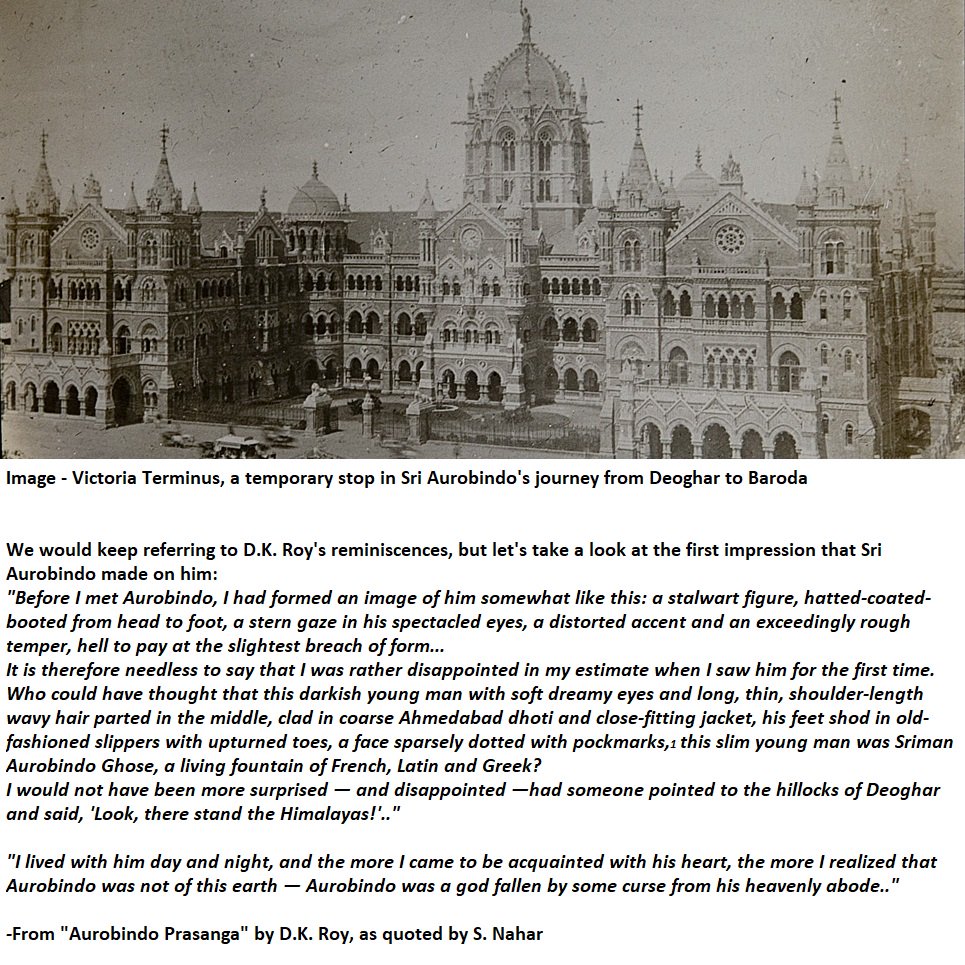
Finally, #SriAurobindo had some friends there whom he knew from his early days in England. The two we know of from His conversations are Keshav G. Deshpande & Bapubhai Majumdar
After Madhavrao, Deshpande was probably the most intimate friend of His:
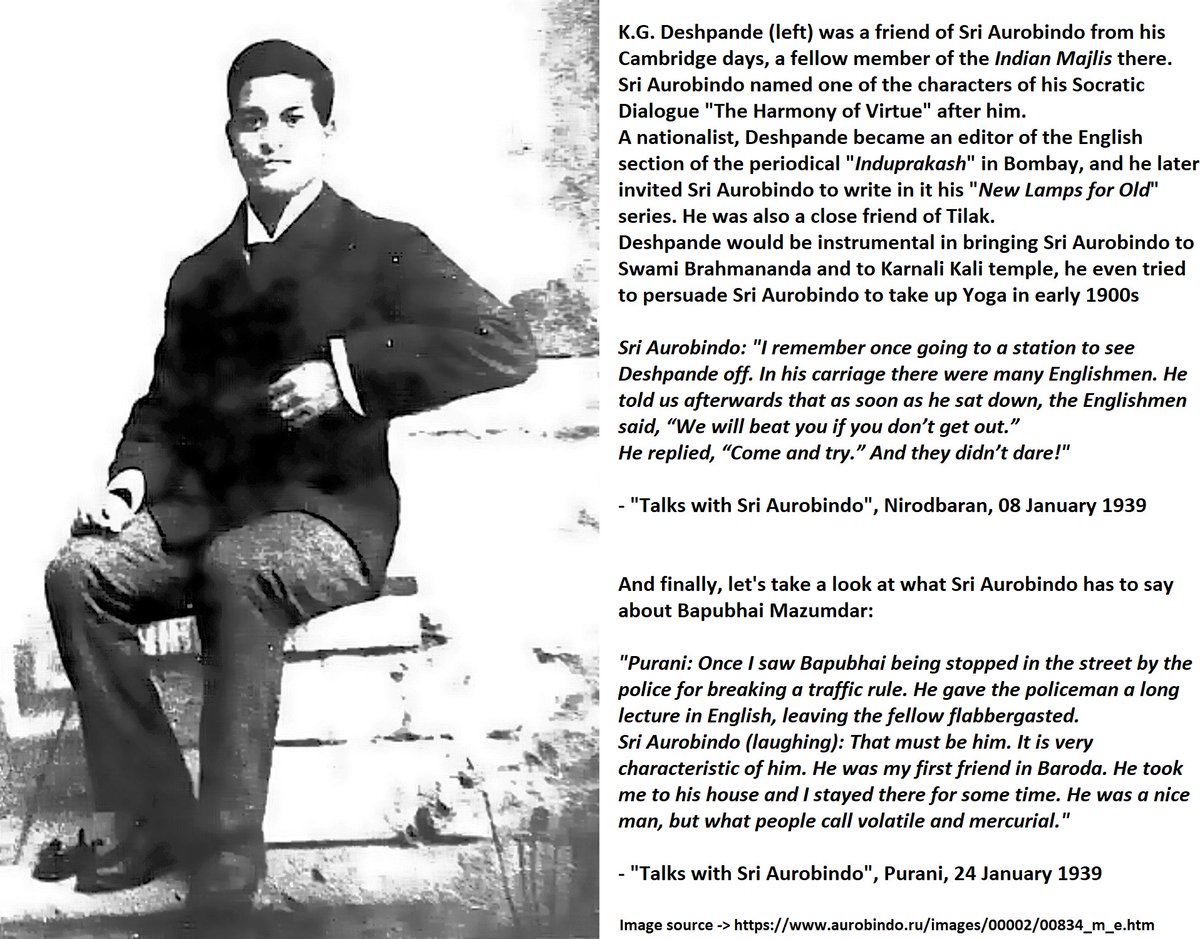
As soon as #SriAurobindo had returned from Nainital, the Maharaja had an assignment ready for Him - To tutor his children!
The Gaekwad would keep giving such peculiar jobs to Sri Aurobindo for the next few years:
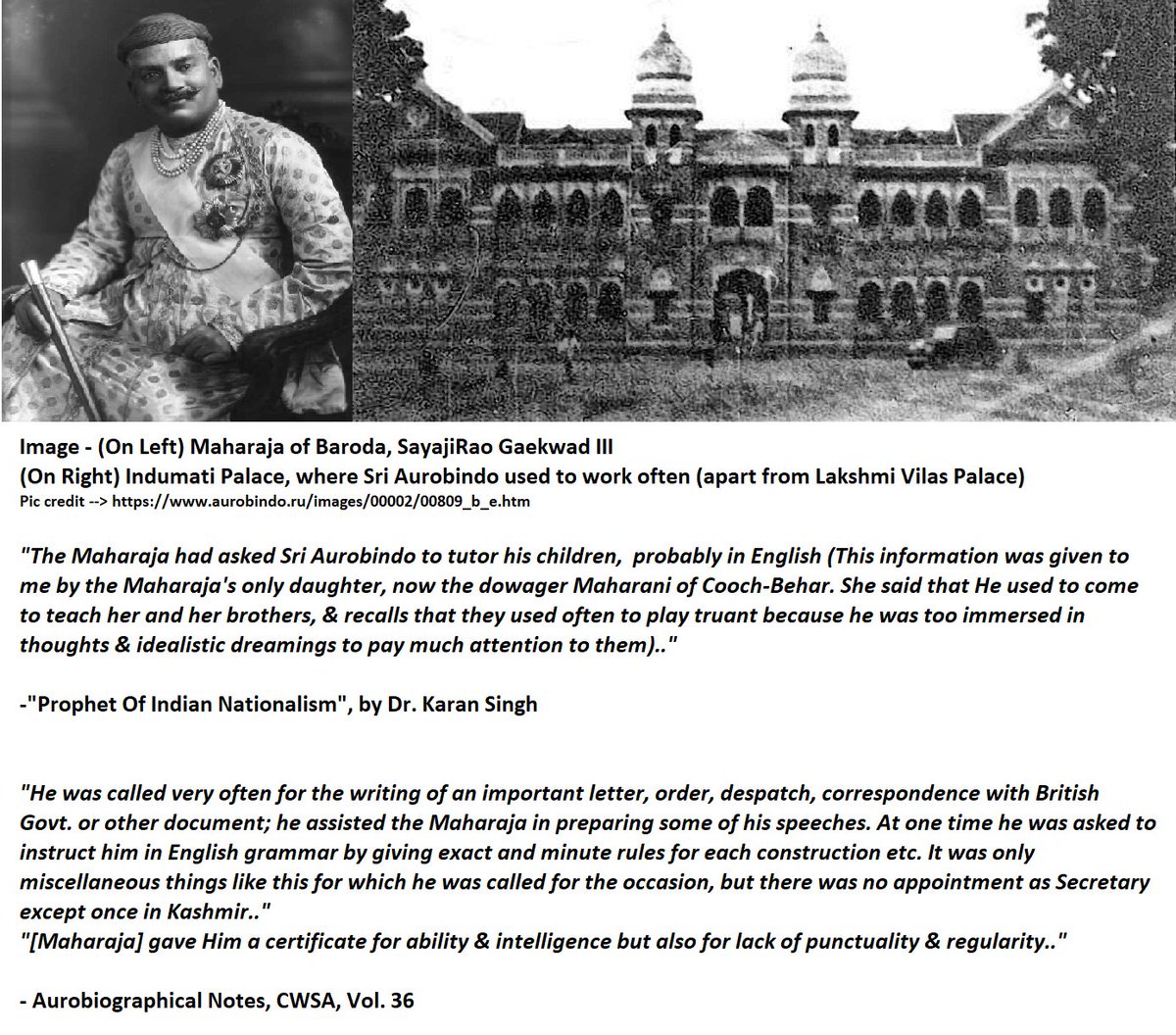
Barindra Kumar, #SriAurobindo's youngest brother, would suddenly turn up in Baroda in 1901, just a few months after Sri Aurobindo's marriage
One with a romantic imagination, he would keep pestering his 'Sejda' for supporting his ever new ventures:
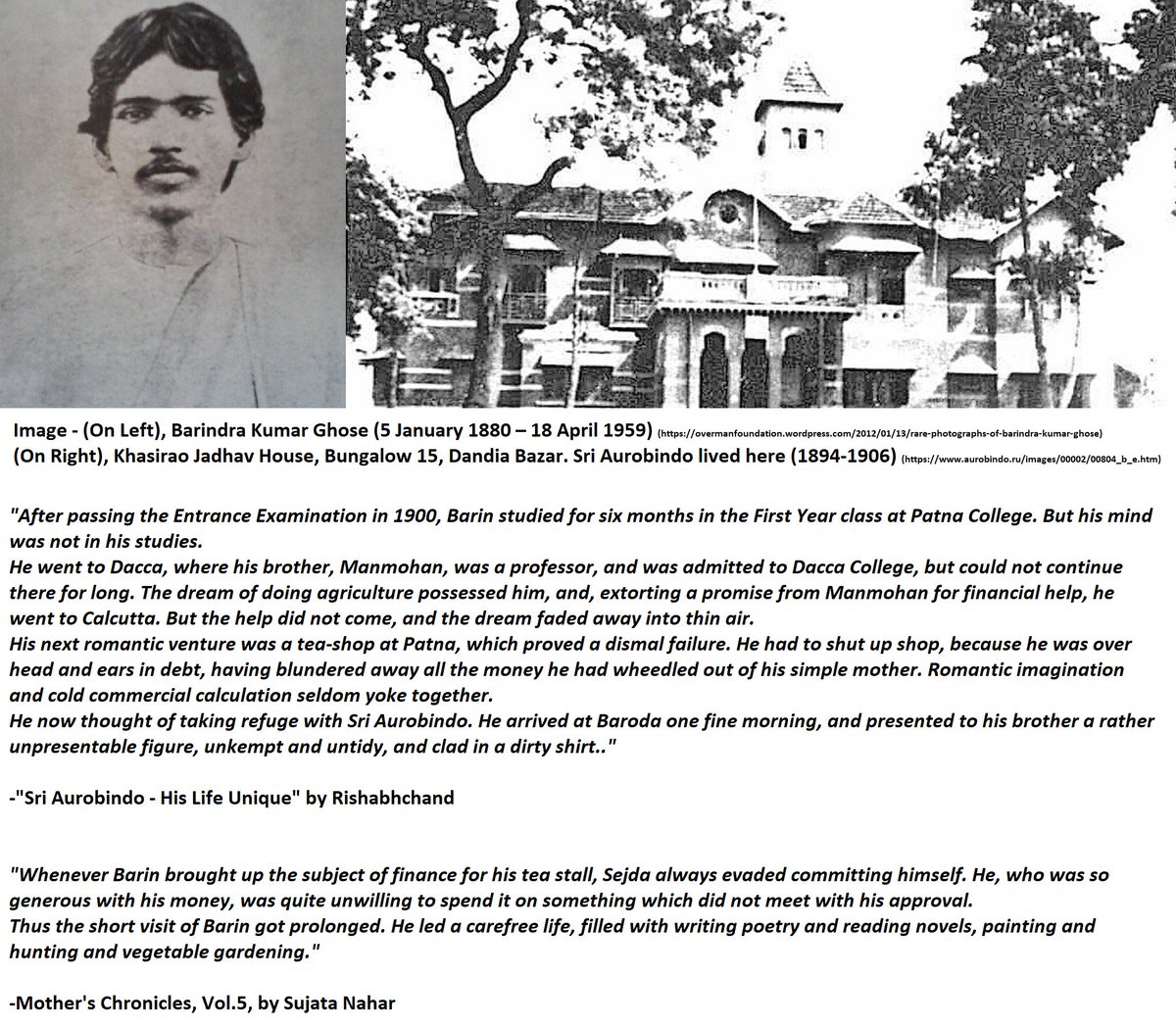
#SriAurobindo had already sent Jatin to Bengal, but in Apr-1902 He applied for a one month leave to guide the revolutionary work.
In a single year, he would be associated with both western & eastern Indian secret revolutions!:
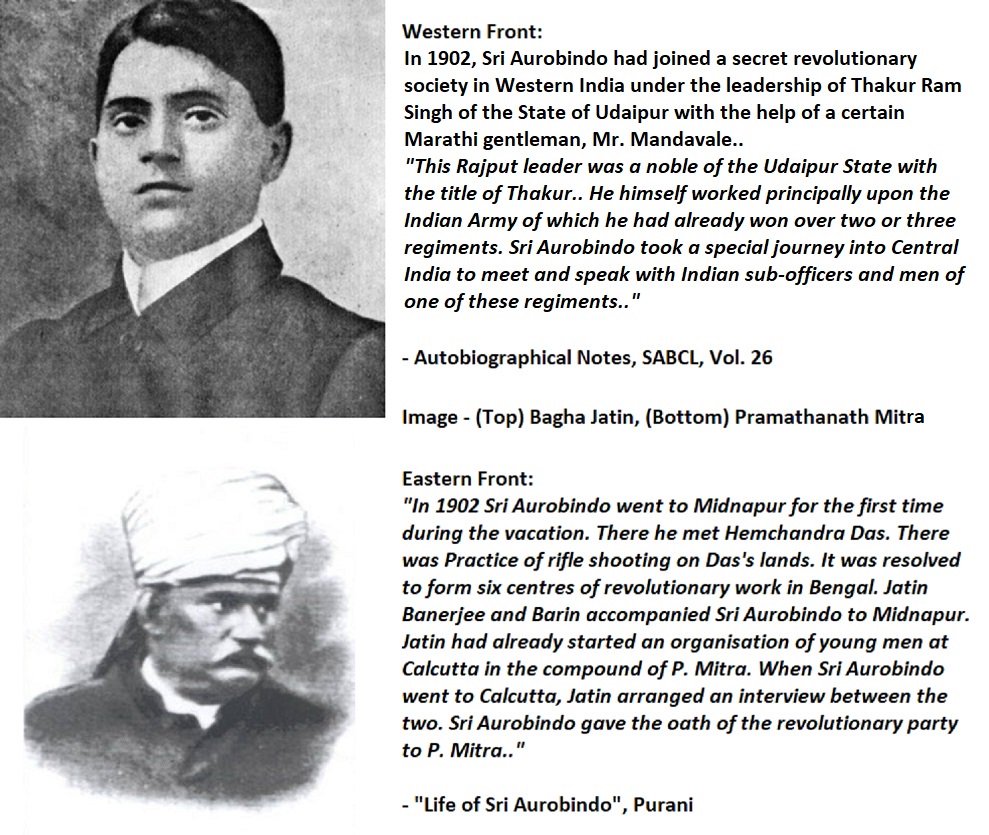
Within few months of #SriAurobindo's marriage, both Sarojini & Mrinalini went back to Calcutta, perhaps due to a plague epidemic in Baroda. He would then be called to Lonavala by the Gaekwad ~ June 1902..
He had a curious nickname for His employer:
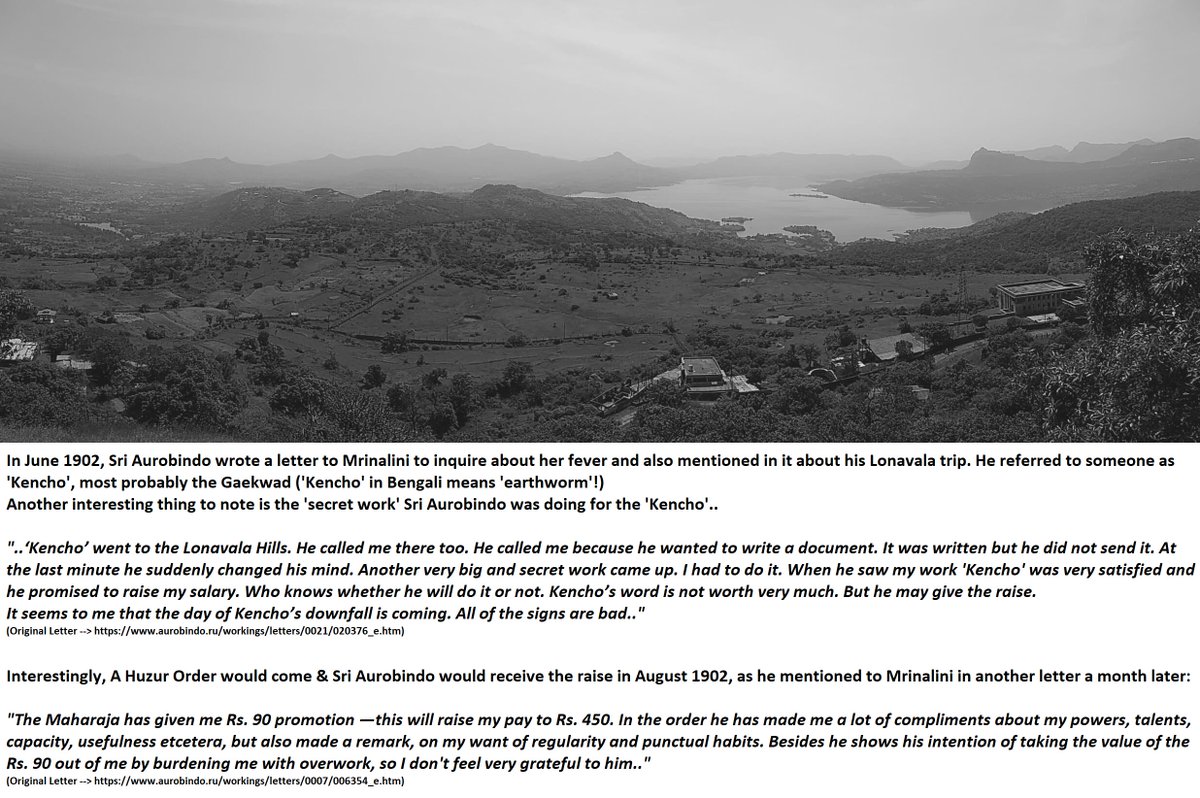
With greater responsibilities,#SriAurobindo had to have some time for recreation. & he had his share of fun while watching cricket! Yes, He was a non-playing member of Baroda Cricket Club
Let's listen to Ahmedabad story 1st (1902):
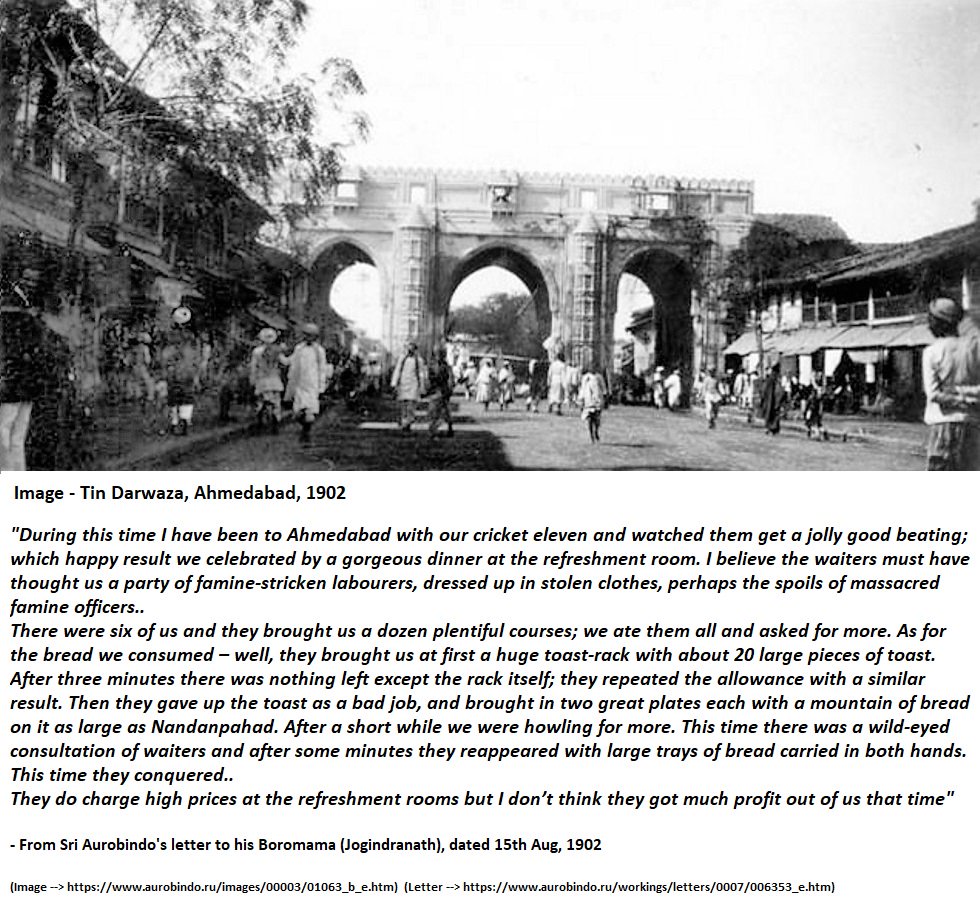
#SriAurobindo was not a sportsman, he had played cricket only as a young boy in Manchester in Mr Drewett’s (his caretaker's) garden. But He had a spectator's interest in the sport.
Now let's listen to the Ajwa picnic story (1902):
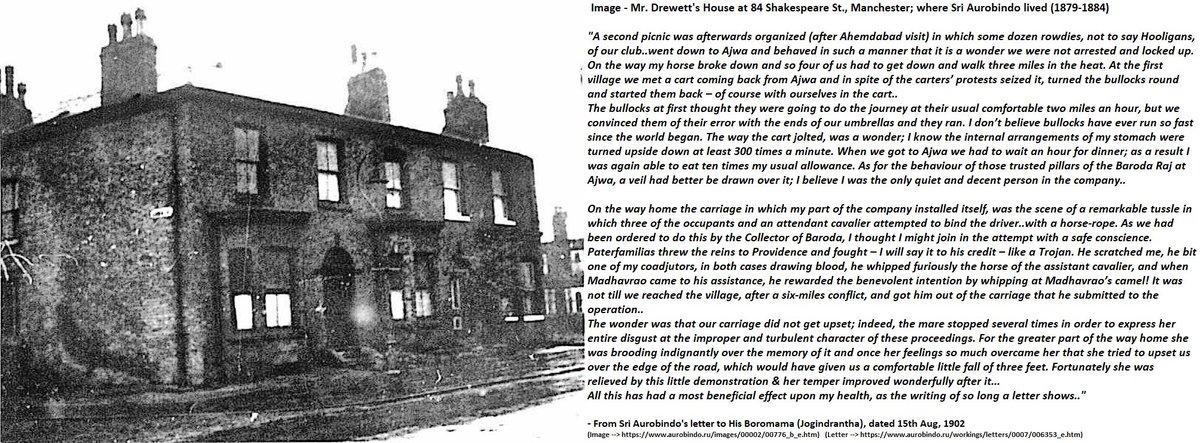
In October 1902, Sister Nivedita would turn up in Baroda from Nagpur during her tour of North India. #SriAurobindo & Khaserao were delegated by the Gaekwad to receive the State guest..
Nivedita had found that day a fellow "worshipper of Shakti" :
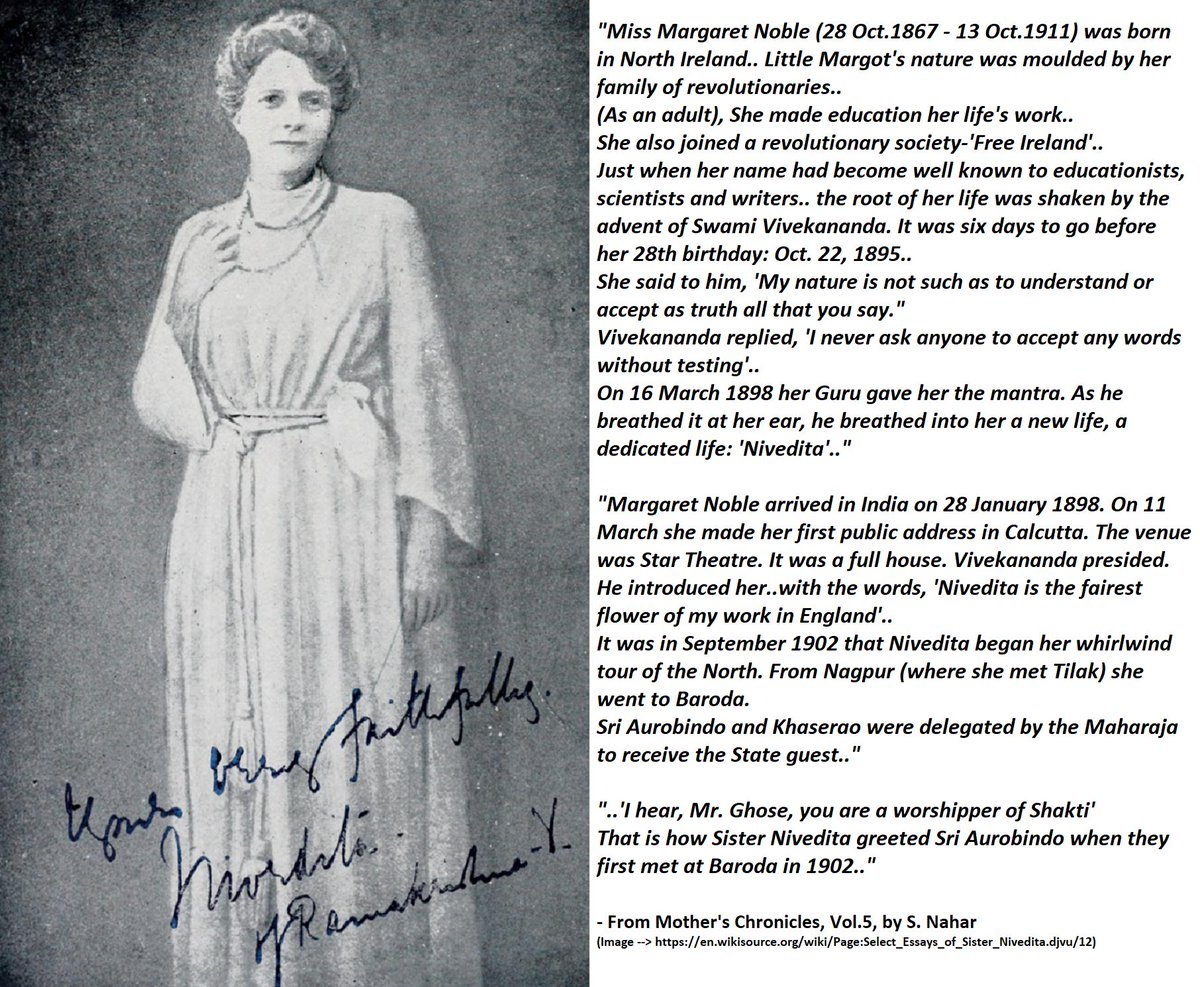
In Dec.1902, #SriAurobindo traveled to Bombay with Barin mainly to meet Govind Madgaokar, an ICS officer & an instrument to spread the revolution in Gujarat..
Also around this time, Sri Aurobindo wrote a remarkable speech for the Gaekwad:
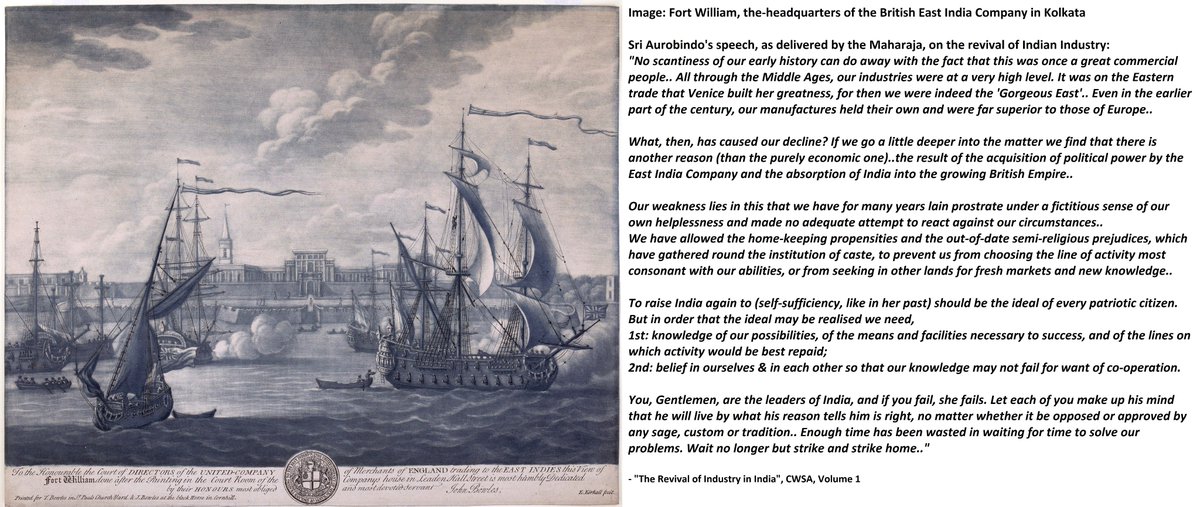
In Dec.1902, Congress conducted its 1st session in Ahmedabad (18th overall), on the financial backing of the ongoing Industrial exhibition (where Gaekwad read #SriAurobindo's speech)..
It was here that the two 'extremists' met for the first time:
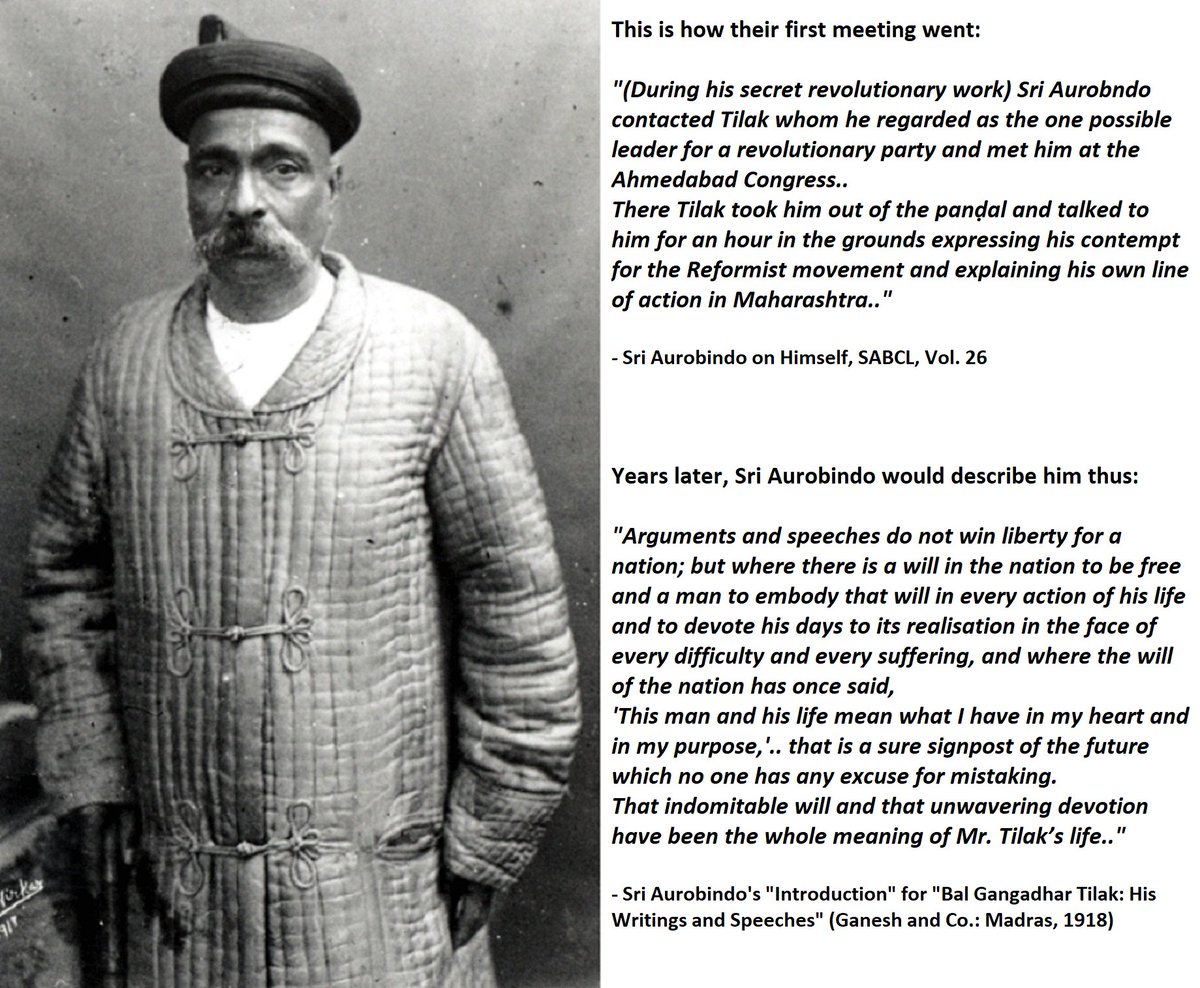
During his Baroda stay, Barin was much influenced by Sri Aurobindo's revolutionary ideas. So ~1902-03, #SriAurobindo initiated him into the secret society & sent him to Calcutta to work with Jatin & others..
The revolution was now picking up pace:
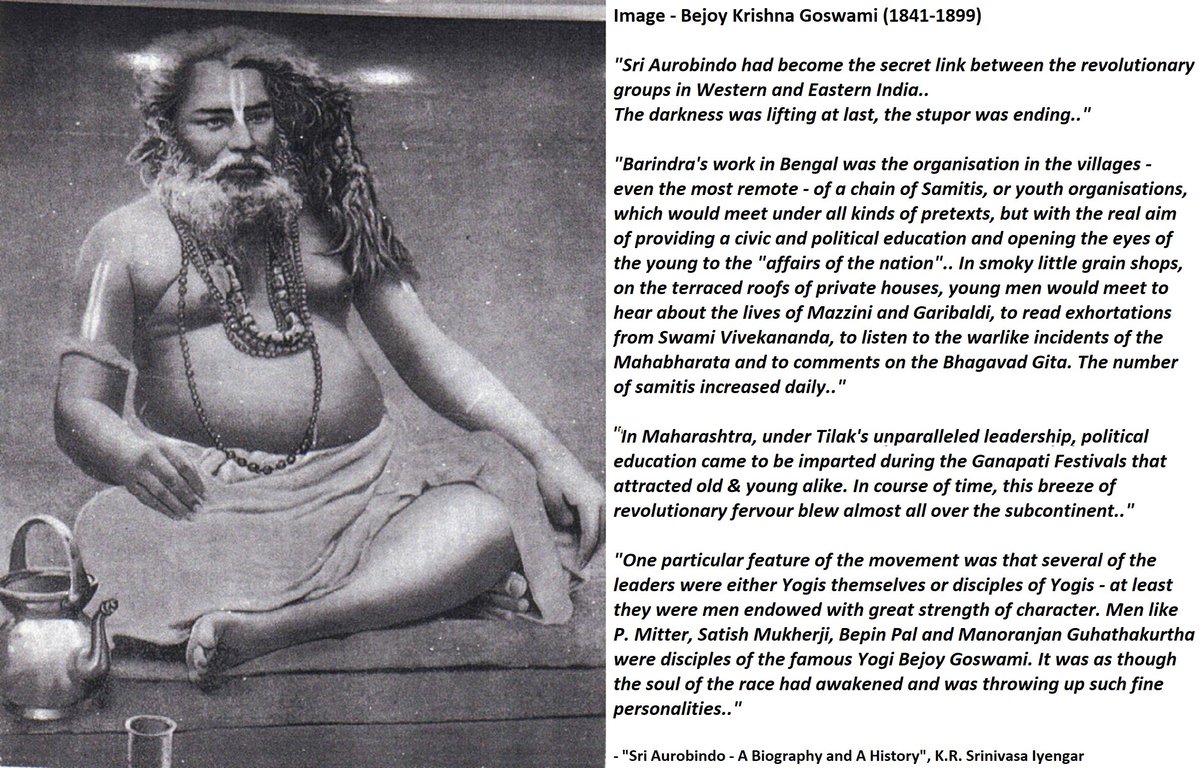
In 1903, #SriAurobindo took one month's leave from 22nd Feb. onward. The reason for the leave was to patch up the differences that had arisen b/w Jatin & Barin at Calcutta.
Barin & others were not too happy with Jatin's disciplinarian nature:
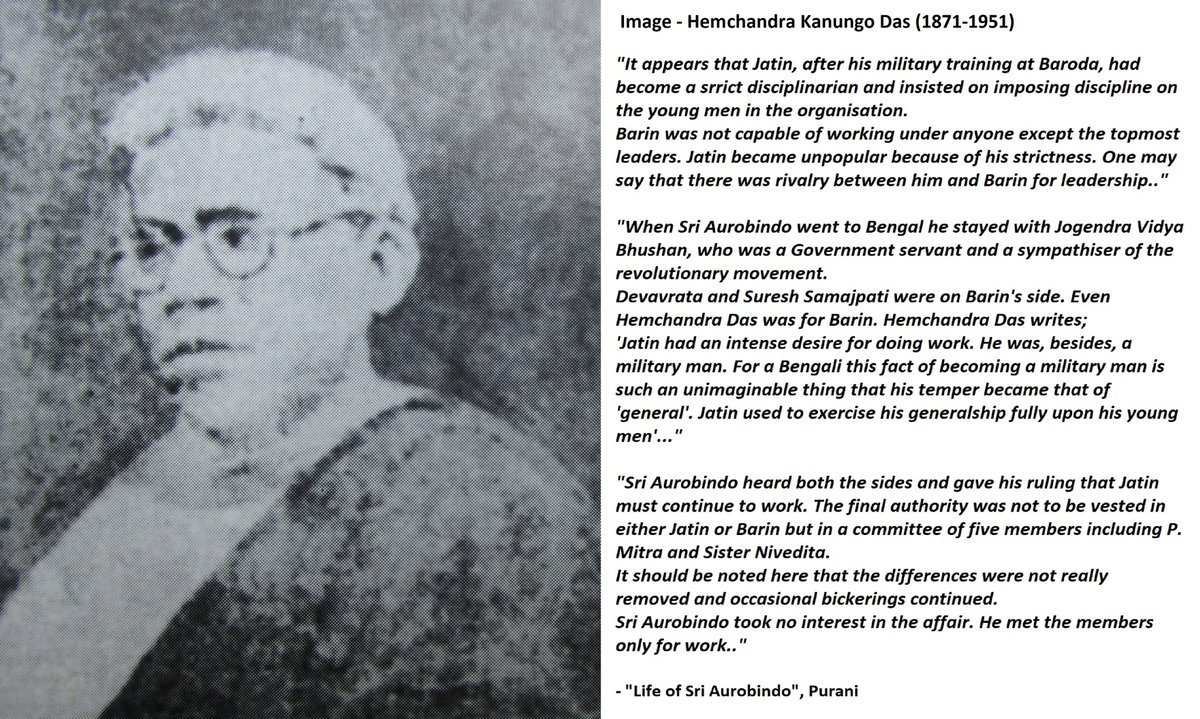
In 1903, #SriAurobindo resumed his part-time services in Baroda college. But the teaching was interrupted b/c of the leave He took in Feb. as we discussed..
And then there was a long tour of Kashmir (May-Sep.) as a Private Secretary of the Gaekwad:
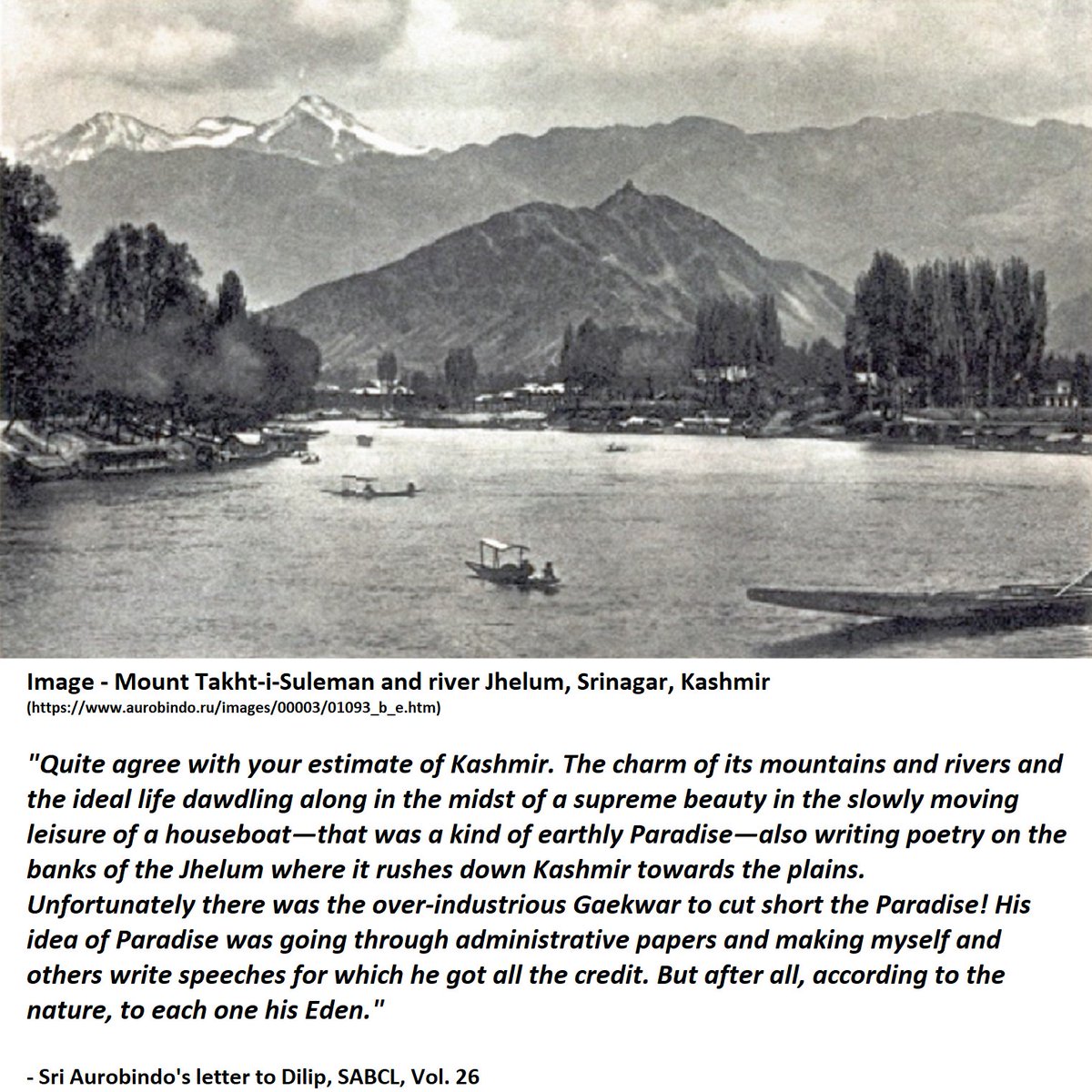
The royal party reached Srinagar in late May, & was there at least three times: ~28 May to ~7th June, for a few days around 23 June, & again for ~10 days after 5 September.
We get a glimpse of #SriAurobindo's experience there from His notes:
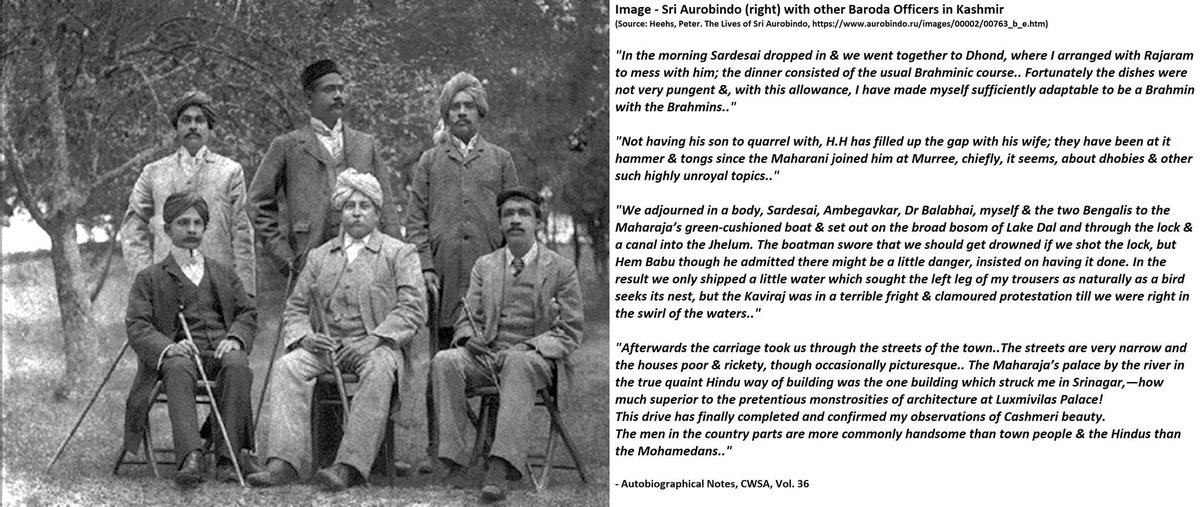
During his tour of Srinagar, #SriAurobindo got the 'Adwaita' realisation at the Shankaracharya Hill. There is a temple on its top housing a large ShivaLingam & a South Indian Bronze statue of Nataraja..
He described the experience in a sonnet:
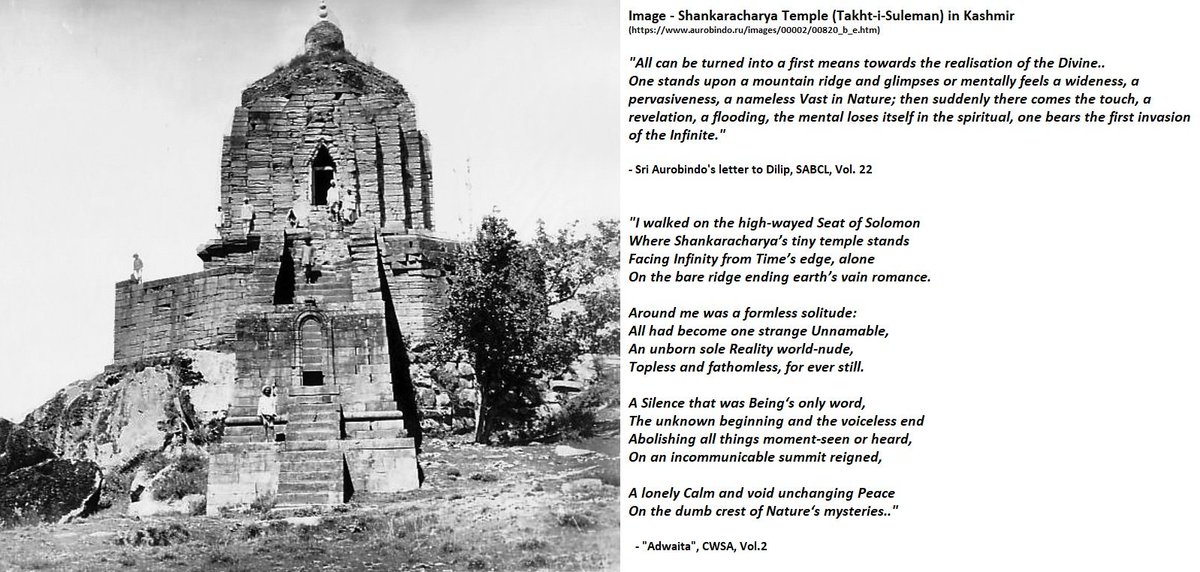
Apart from Srinagar, the royal party also visited Achabal, Gulmarg & Ganderbal; and would return to Baroda via Murree & Lahore by October..
There was much friction b/w the Maharaja & #SriAurobindo during the tour & the experiment was not repeated:
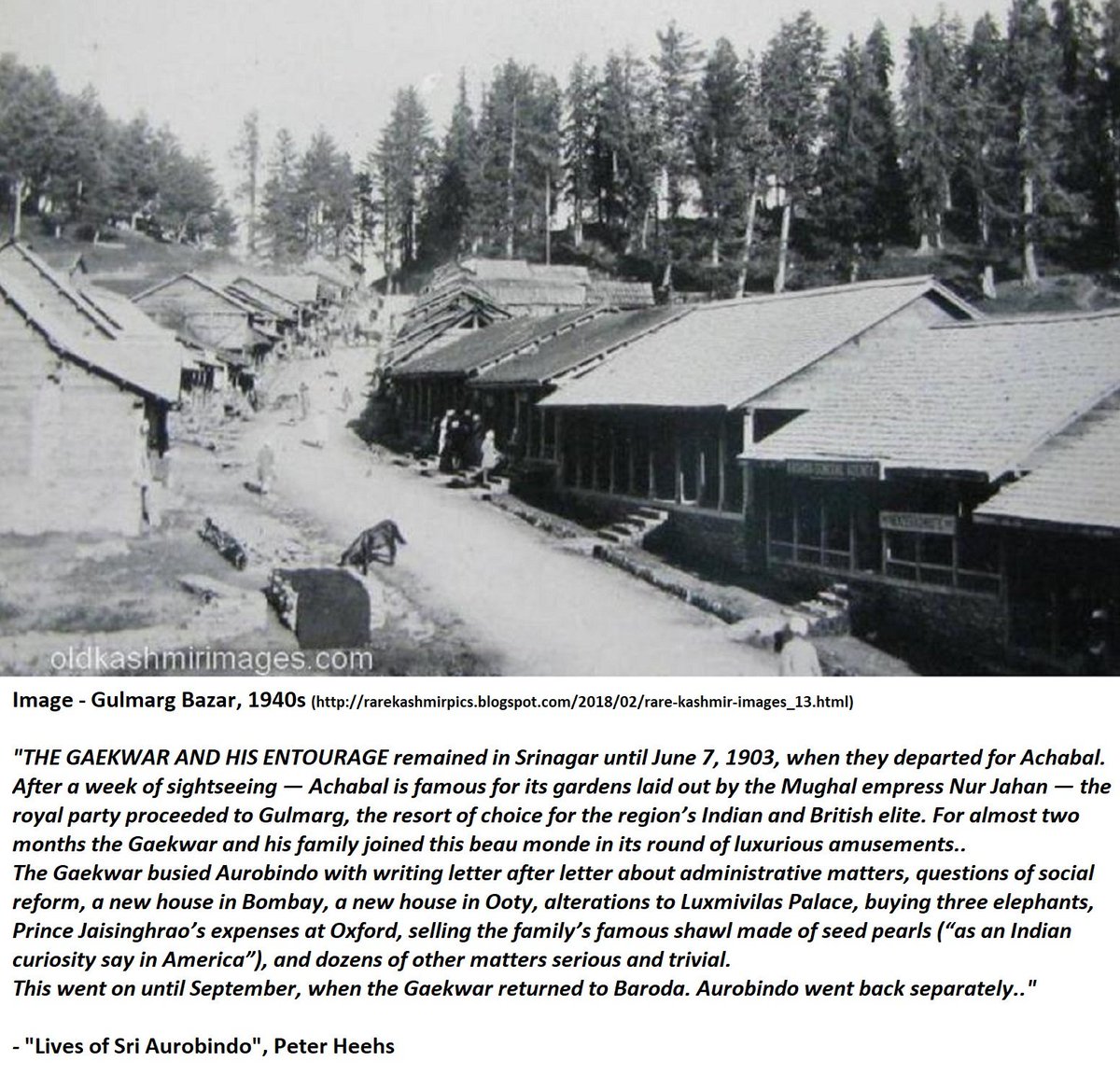
~1903, #SriAurobindo met Jatin Mukherjee during a trip to Bengal. Jatin decided to collaborate with Him & may have added to His program the clause of winning over Indian soldiers of British regiments..
Sri Aurobindo had a great regard for him:
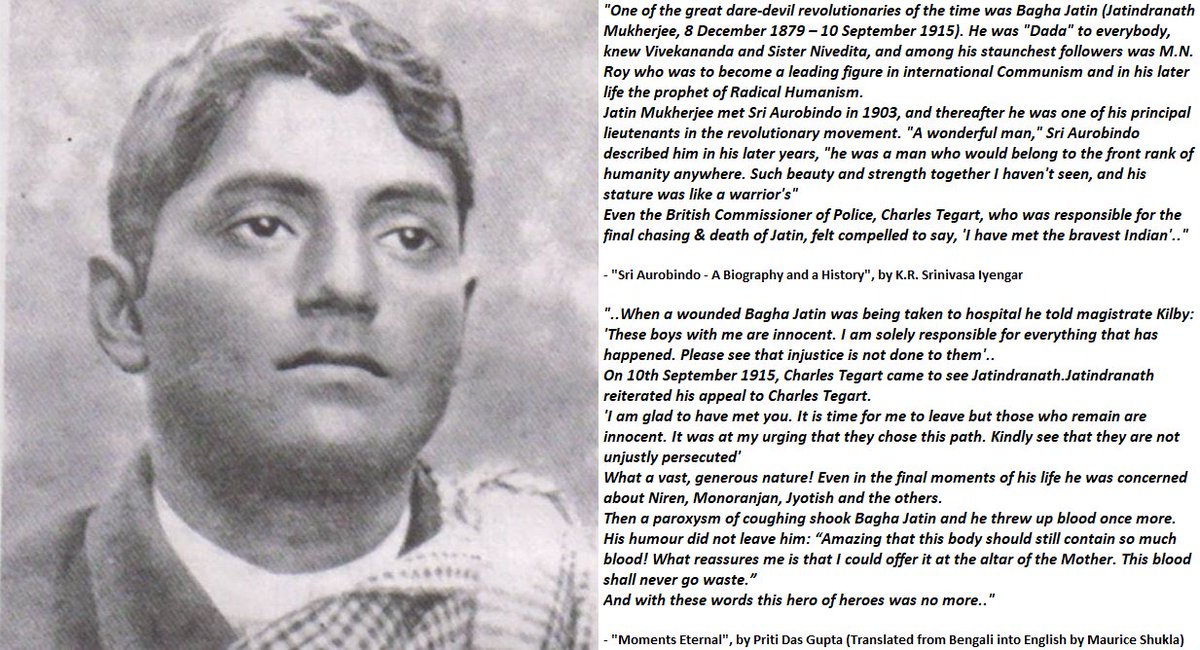
It was ~1904 that #SriAurobindo started Yoga w/o a Guru. He had spiritual experiences before, but He still thought of Yoga as life-denying, not suited for revolutionaries..
The story of His initial turn towards Yoga is quite interesting:
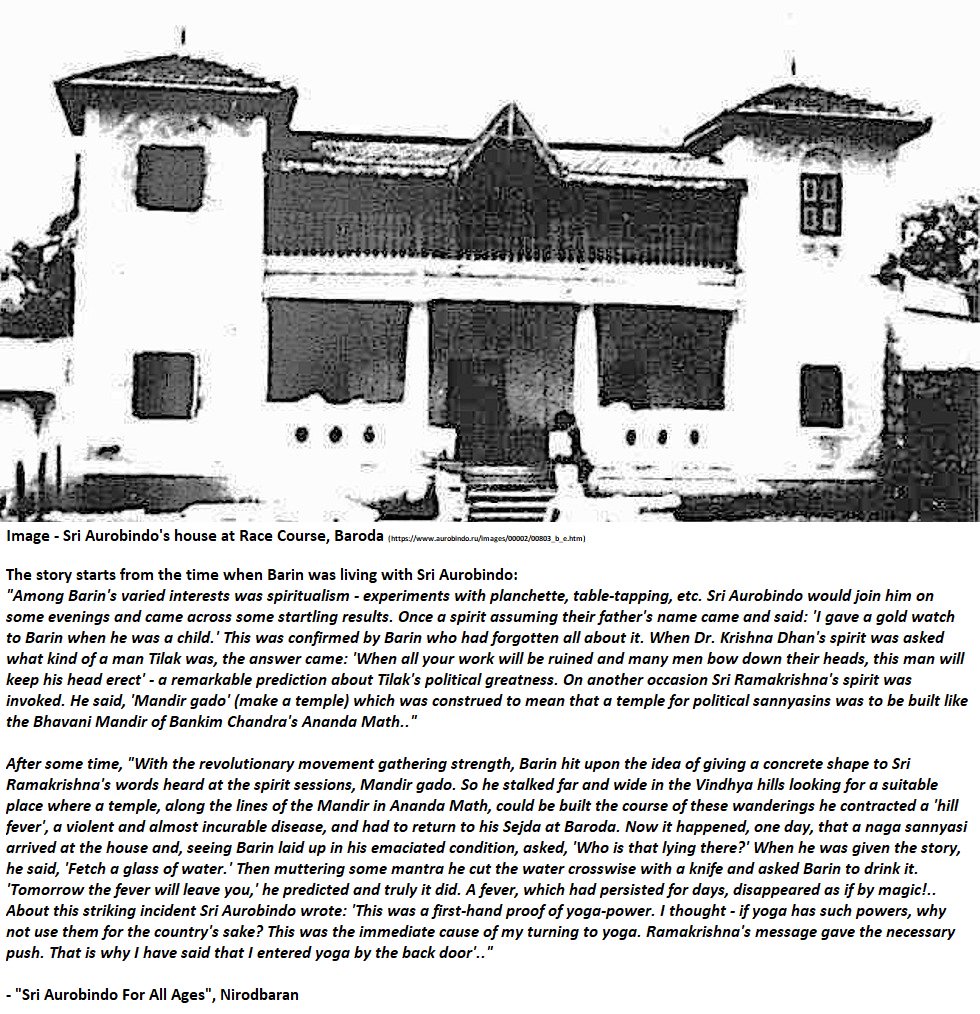
On the path of yoga, #SriAurobindo first started to practise Pranayama at Khaserao Jadhav's place, after receiving some guidance from A.B. Deodhar (a Baroda engineer)..
He got some very remarkable results from this practice:
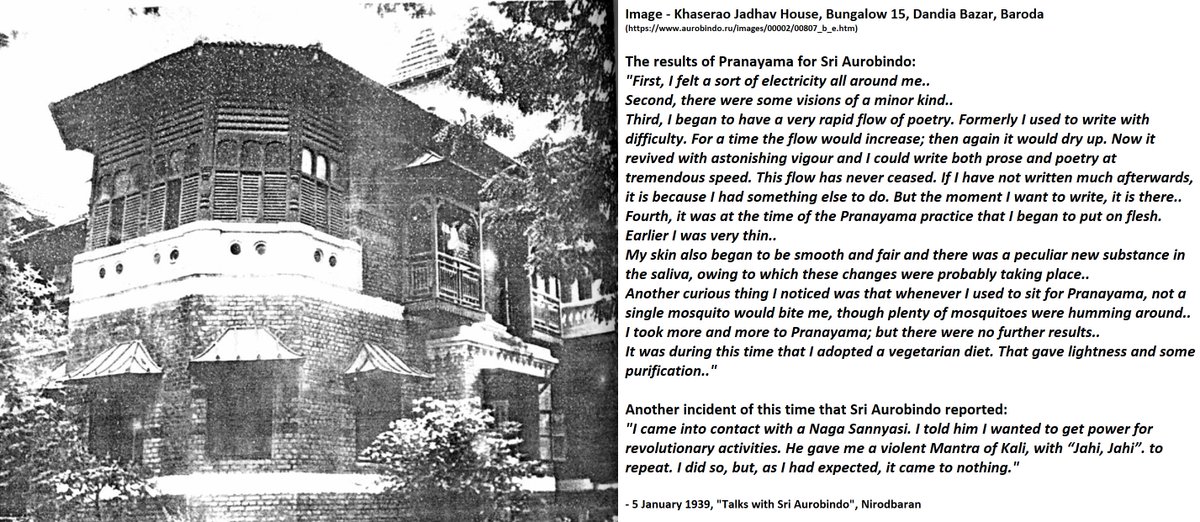
Deodhar was a disciple of Brahmananda of Chandod, as were the Gaekwads. #SriAurobindo had momentary contacts with the Yogi..
As the legend goes, the Swami used to keep his eyes closed, but when SA visited, he observed Him with a full gaze!:
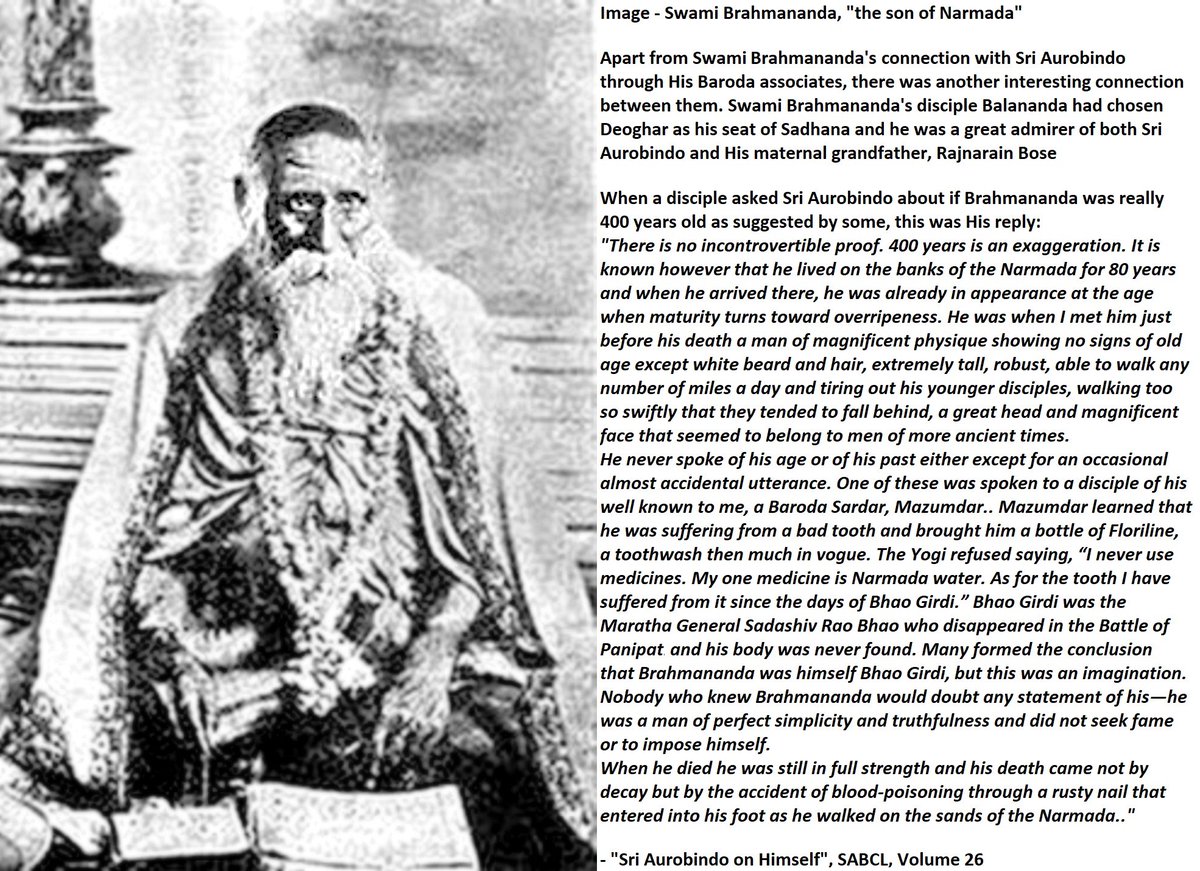
Adjacent to Chandod is Karnali with a temple of Mahakali on the bank of Narmada. It was here that #SriAurobindo had the experience of a 'living presence' of the World Mother (~1905)..
He later wrote a sonnet describing the same:
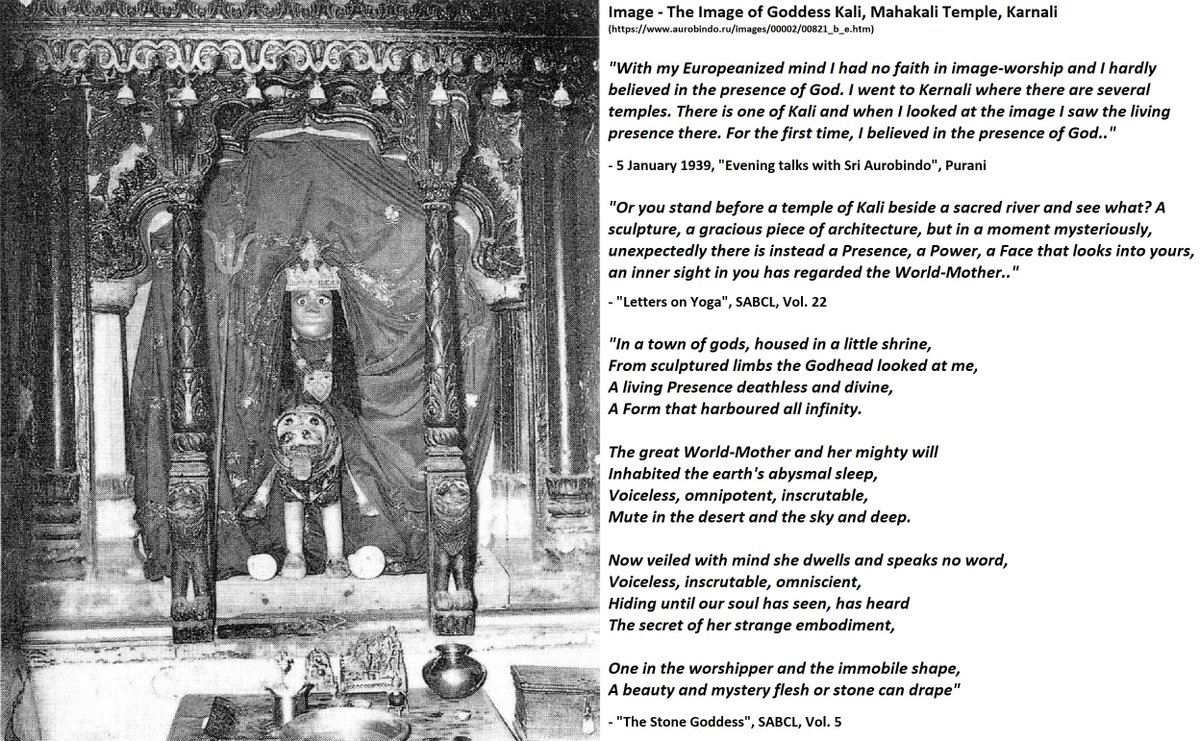
~ Early 1905, Gaekwad had plans to leave for Europe, & he allowed #SriAurobindo to devote more of His time to Baroda College, as vice principal & a professor..
His revolutionary passion would reflect in His students also, incl. one K. M. Munshi:
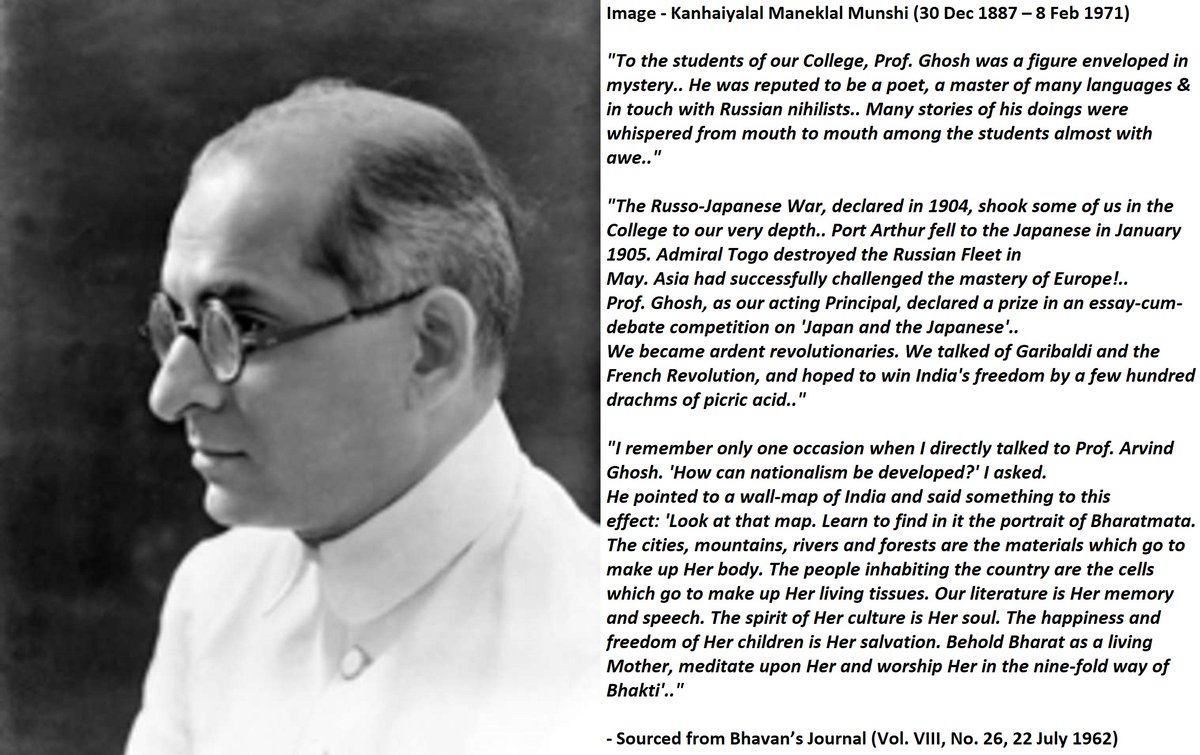
On Mar. 3, 1905 #SriAurobindo was made the acting principal of Baroda College, with an increase in salary (now ~Rs 710/month) but also with an increase in admin. duties.
During the mid-year break, He would get time to read & write:
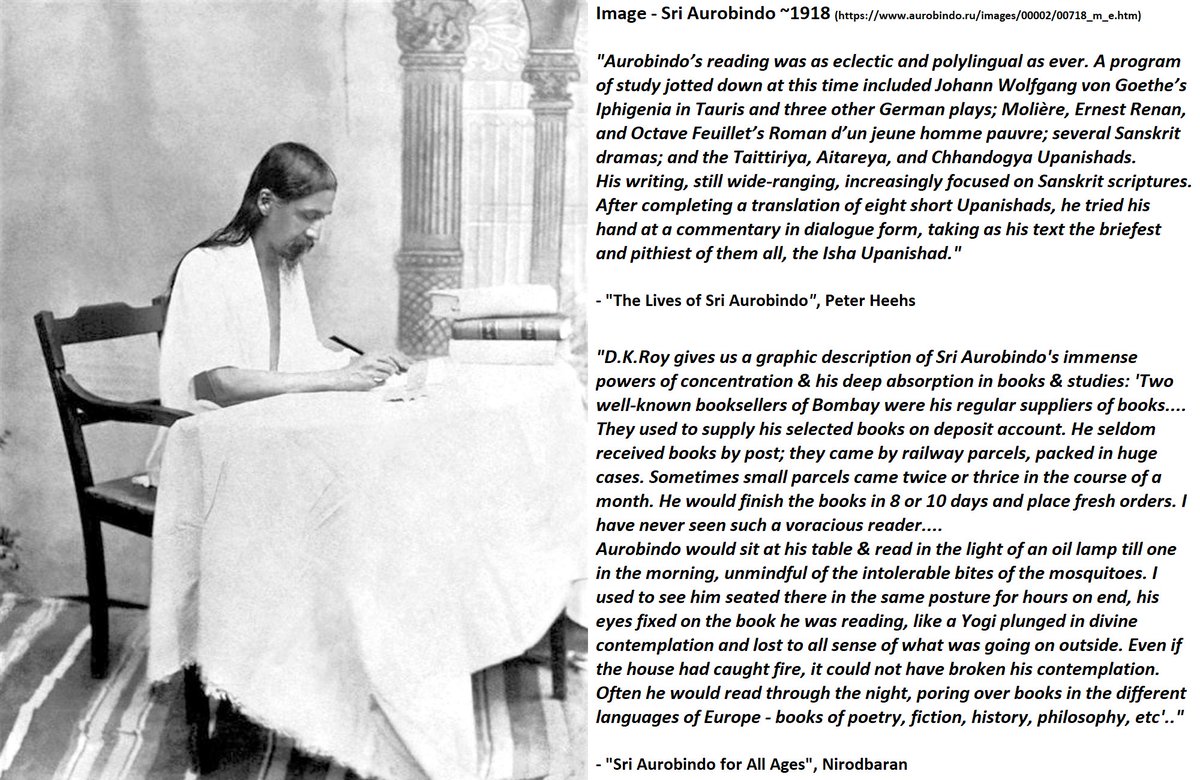
#SriAurobindo had been working from behind the veil for the revolution. But with Curzon's decision to partition Bengal (1905) a threshold was reached & He would decide to come to the front..
He had identified the danger early on:
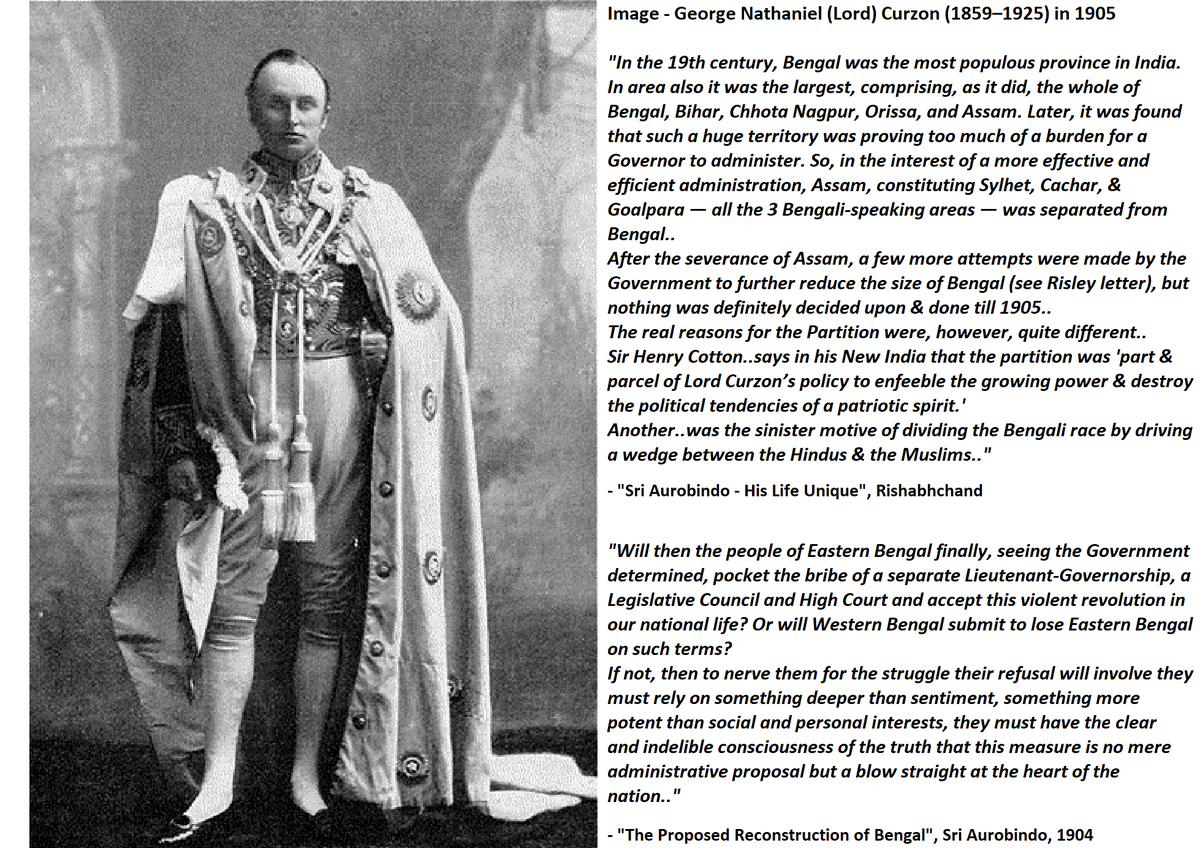
During the upheaval, #SriAurobindo made one his first public appearances at a political meeting (in Baroda, 24 Sep. 1905).
Also ~Aug 1905, He wrote his famous pamphlet 'Bhawani Mandir', perhaps inspired by Bankim's 'Anandamath':
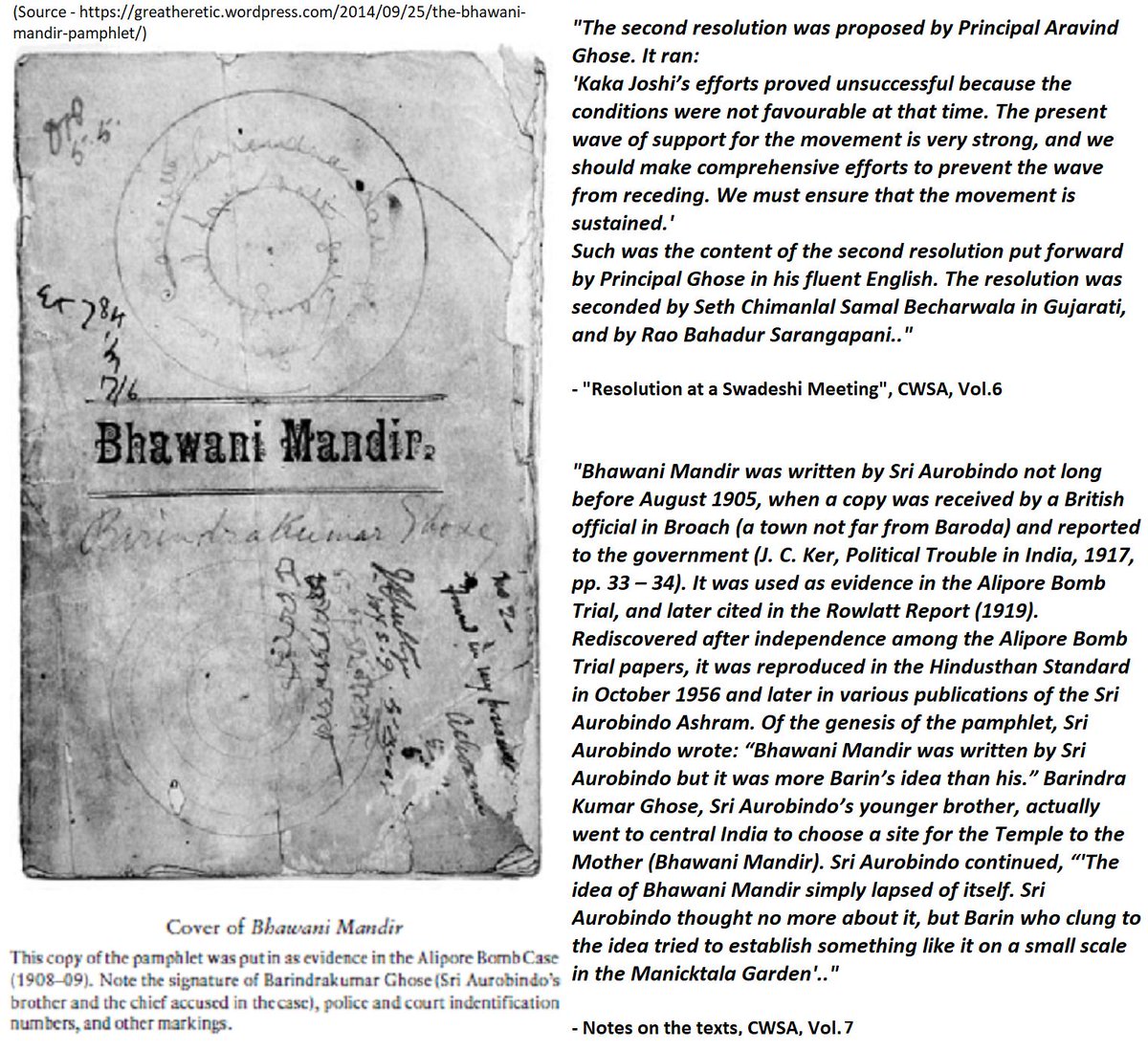
The partition came into effect on 16 Oct 1905, amidst protests by the community. Resistance campaigns of all types were organised.
#SriAurobindo knew the 'Hour of God' had come. He had written a letter to Mrinalini on 30th Aug:
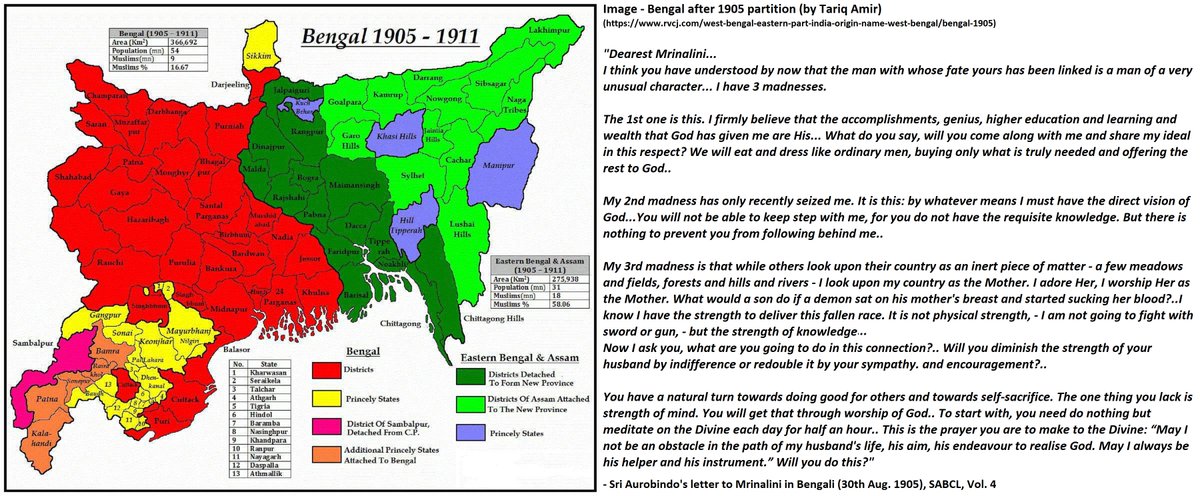
With the backdrop of the partition, the Benares Congress session was held in Dec-1905. #SriAurobindo pushed for the adoption of the fourfold programme of Boycott there.
For all practical purposes, He would leave Baroda by 1906:
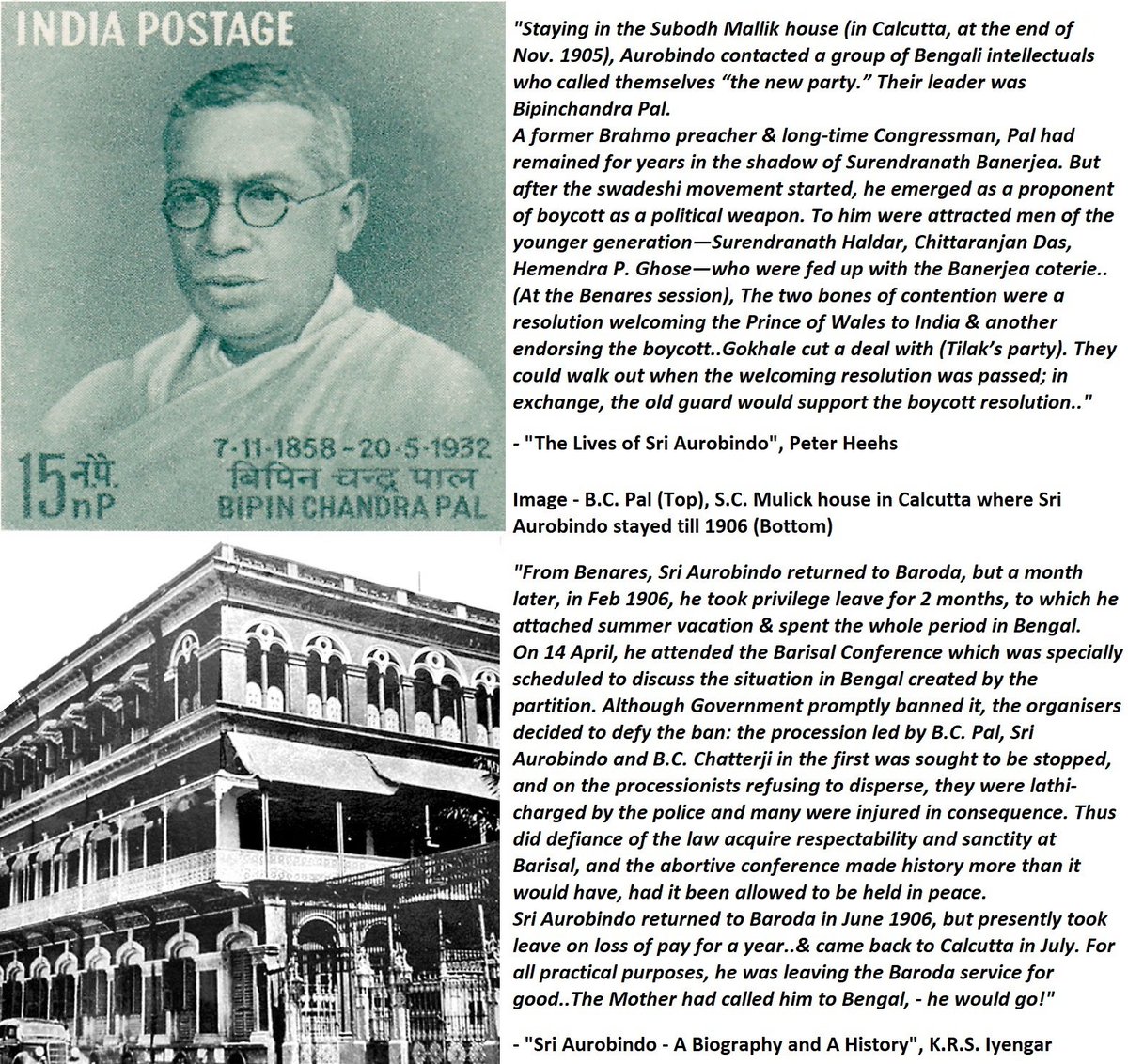
#SriAurobindo was involved with National education policy from early 1906 & was appointed the 1st principal of Bengal National College on 15th Aug..
He also started the revolutionary Bengali paper 'Yugantar' in March:
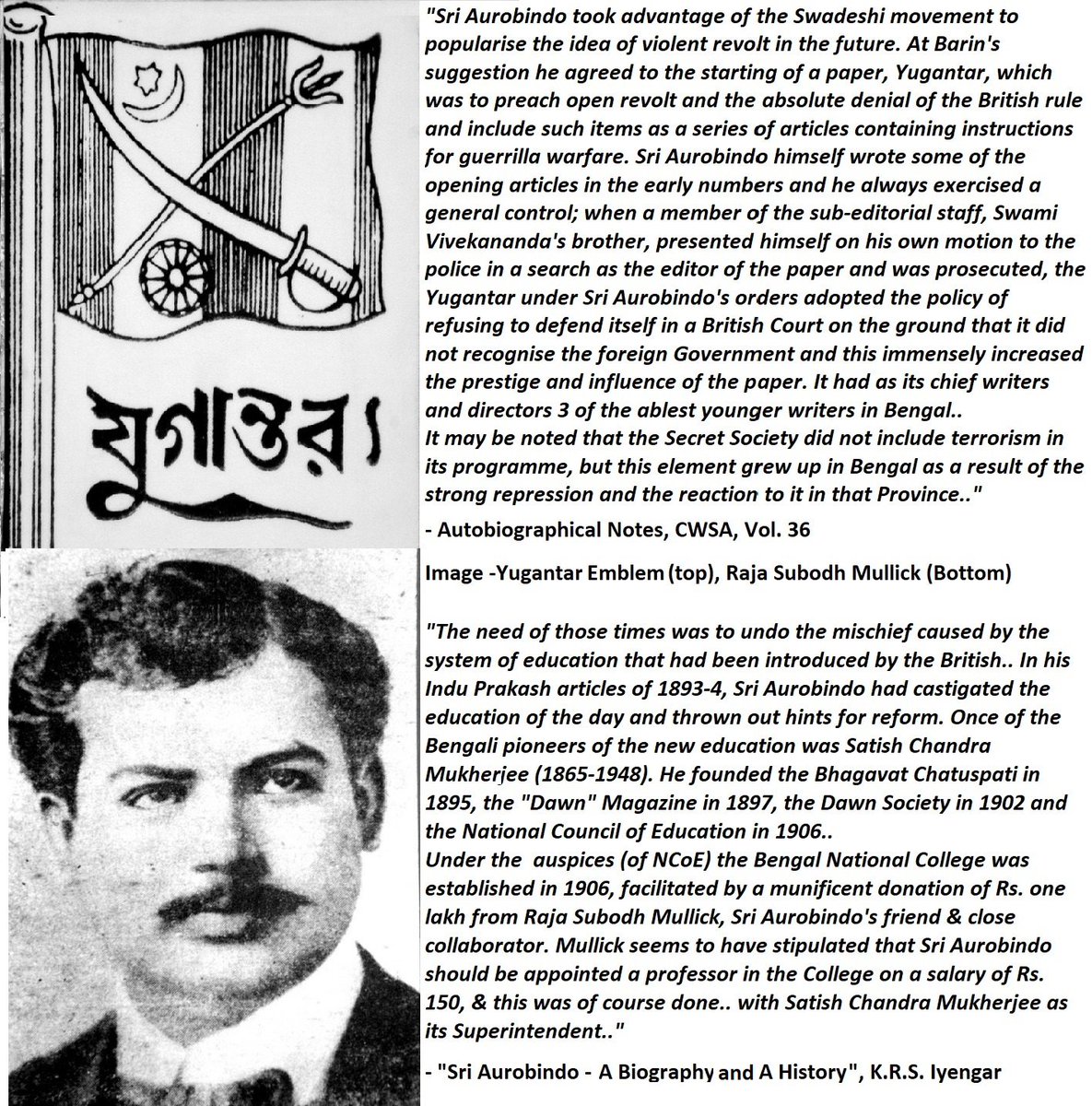
Bipin Pal started 'Bande Mataram' ~Aug.1906 to give a much needed English lang. organ for the Extremists, & via #SriAurobindo it achieved great heights.
In Dec, Calcutta session also proved to be a major success:
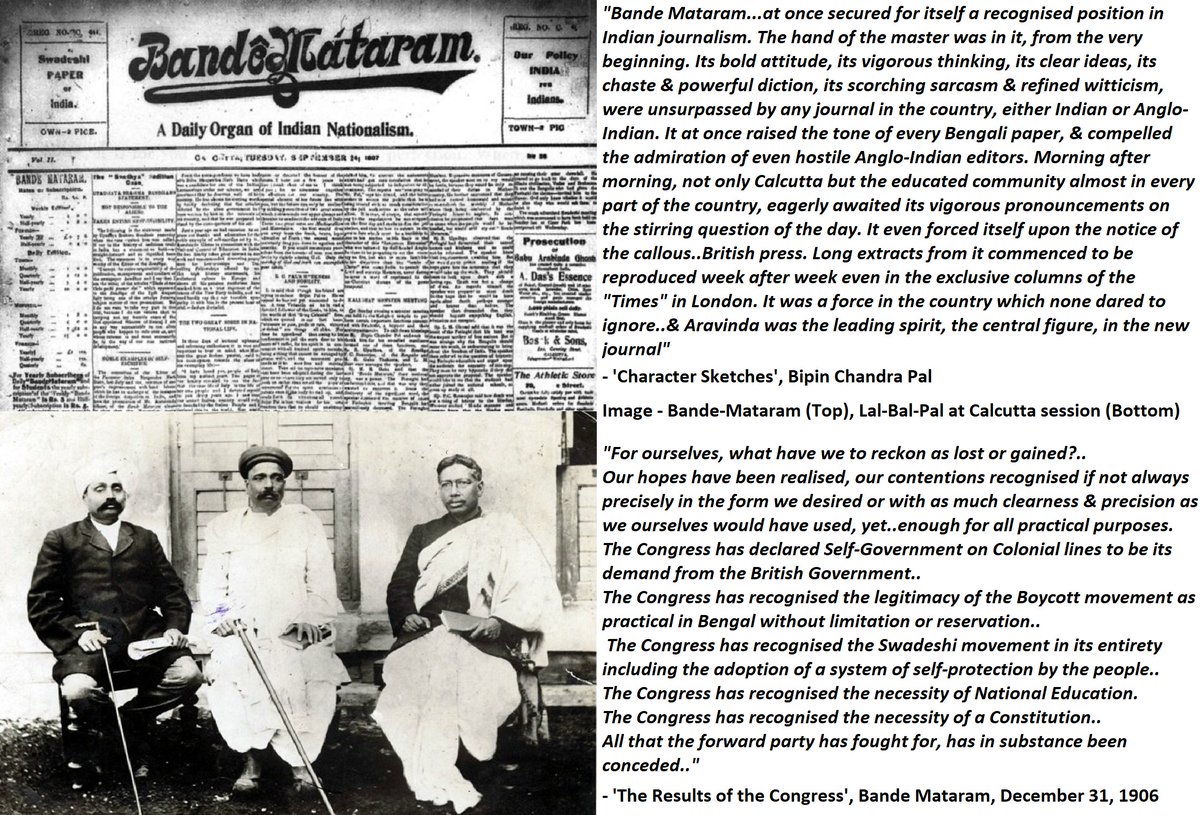
#SriAurobindo wasn't in good health ~early 1907 & traveled a few times to Deoghar to rest. He also went to Khulna ~Jun to found a National school & received a royal reception.
Meanwhile, British Govt had planned a crackdown:
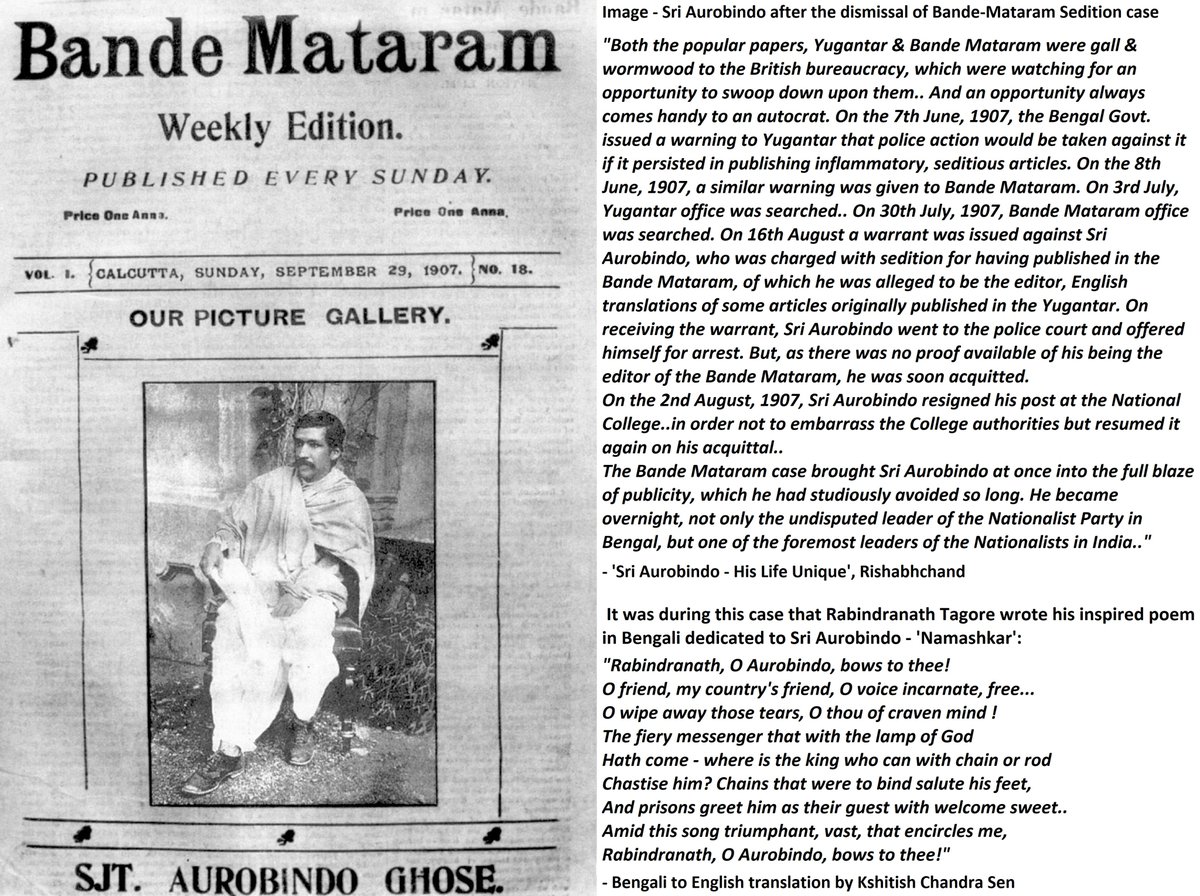
Given the flurry of people wanting to meet Him after His acquittal, #SriAurobindo moved to Choku Khansama’s Lane with His wife & sister ~Oct-1907..
At Midnapore, the Extremists & the Moderates were on a collision course:
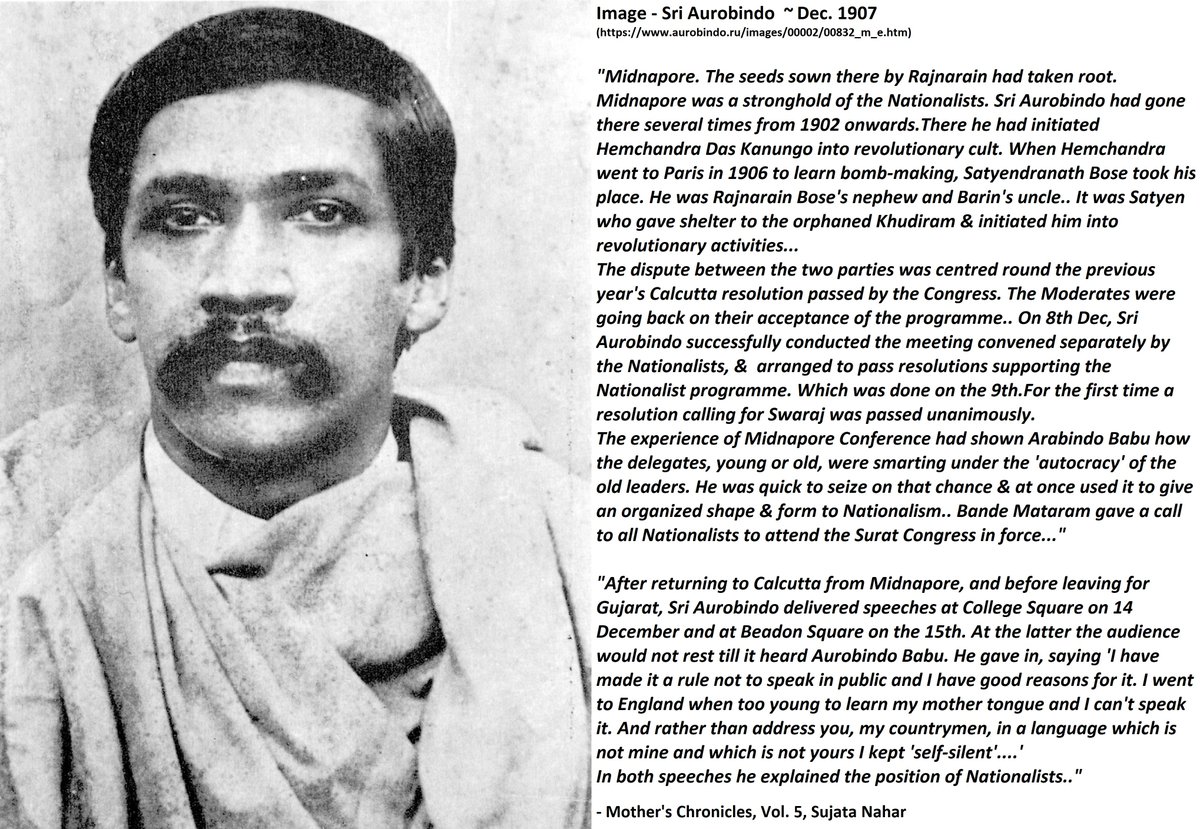
Moderates & Extremists went to Surat session (1907) with their daggers drawn, & out came the result—Congress was split..
History may have not accurately recorded it, but it was #SriAurobindo who changed India's political destiny at Surat:
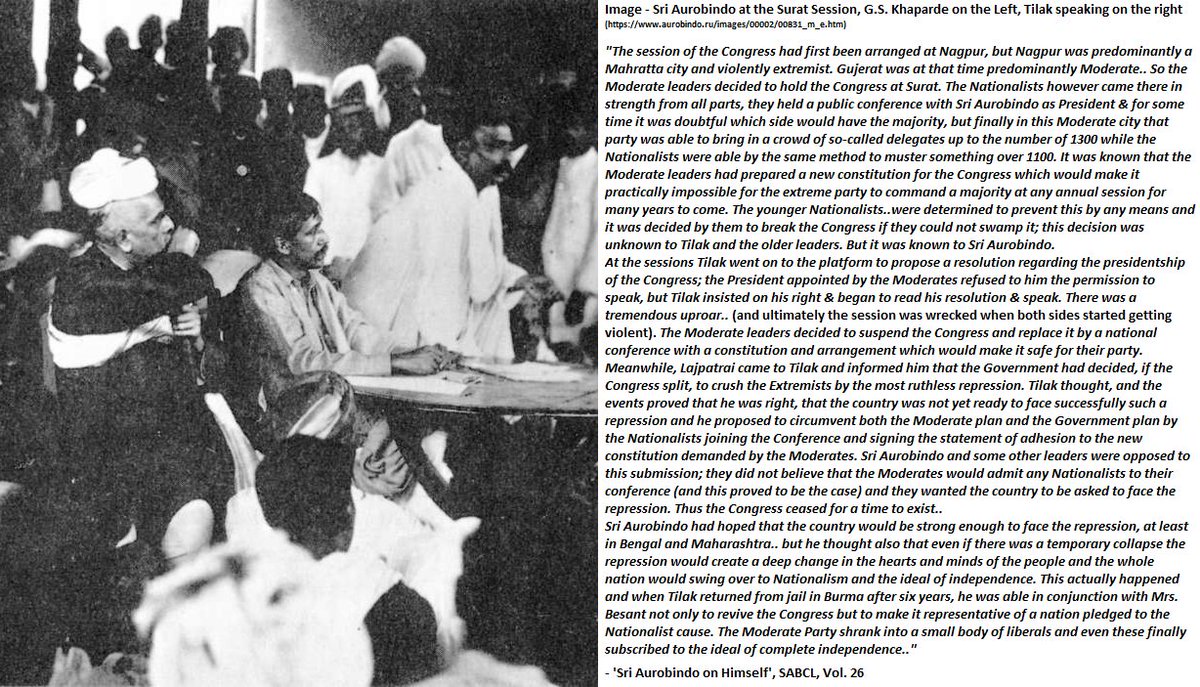
Through Barin, #SriAurobindo came into contact with a Maharashtrian Yogi named Lele. With instructions from him, Sri Aurobindo achieved the 'Vedantic' Nirvana in Jan. 1908..
This Nirvana became for Him the first step towards the complete thing:
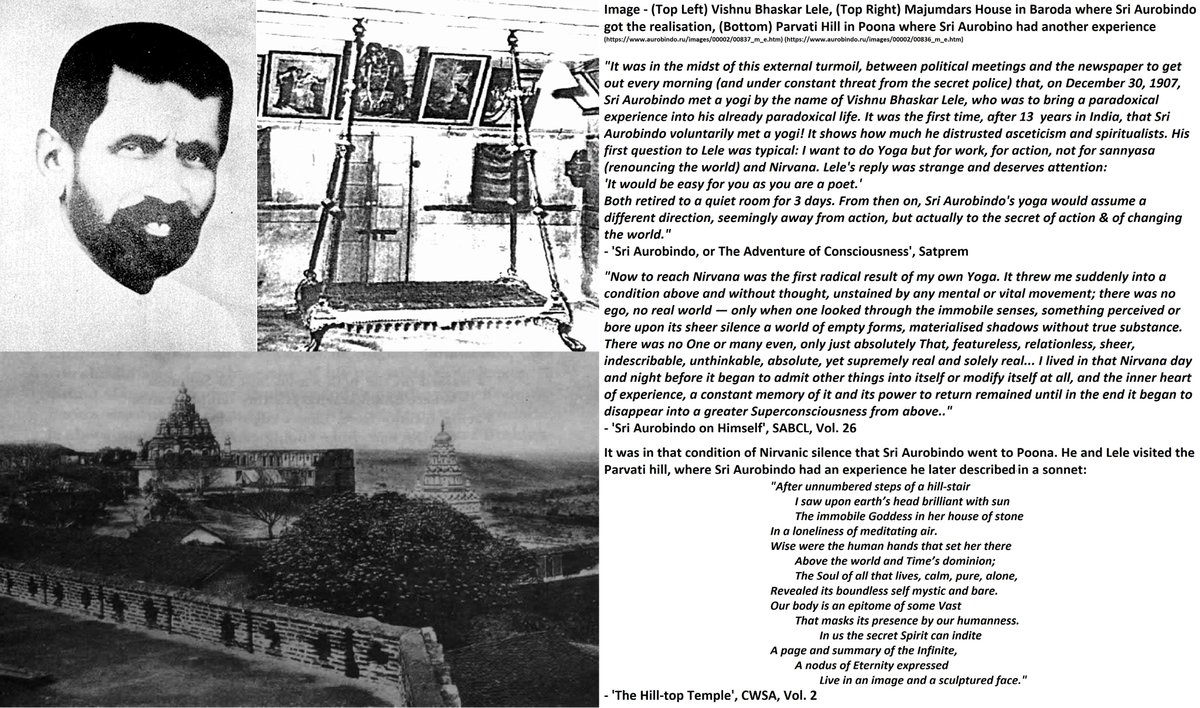
In the state of Nirvanic silence, #SriAurobindo had to deliver political speeches! How to do that? Lele asked Him to just go to the stage & make a pranam to Narayana.
& the whole speech came down from above:
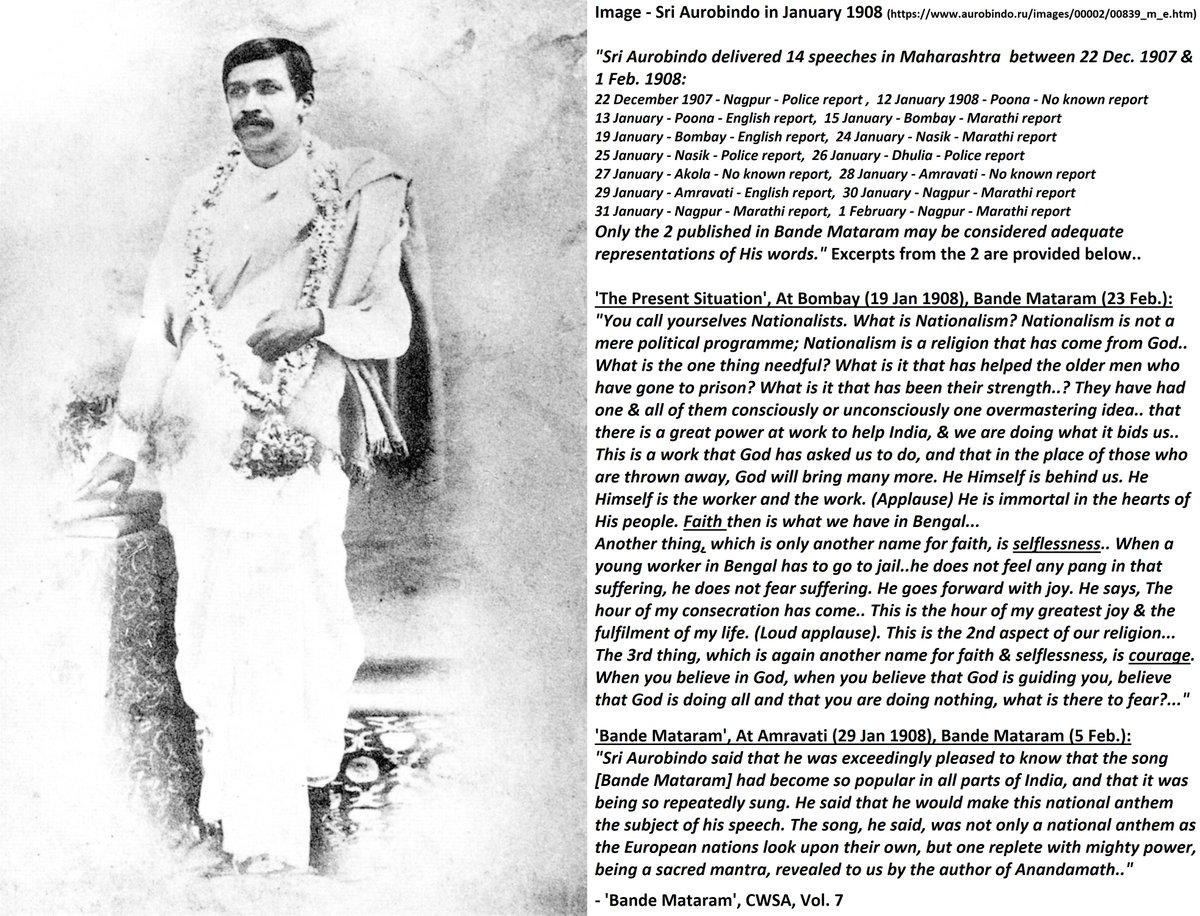
#SriAurobindo continued His political work in that mental silence. He was now living at 23 Scott's Lane, Calcutta. At Pabna, Moderates & Extremists arrived at a kind of agreement.
In Mar, He went to Howrah to receive Bipin Pal:
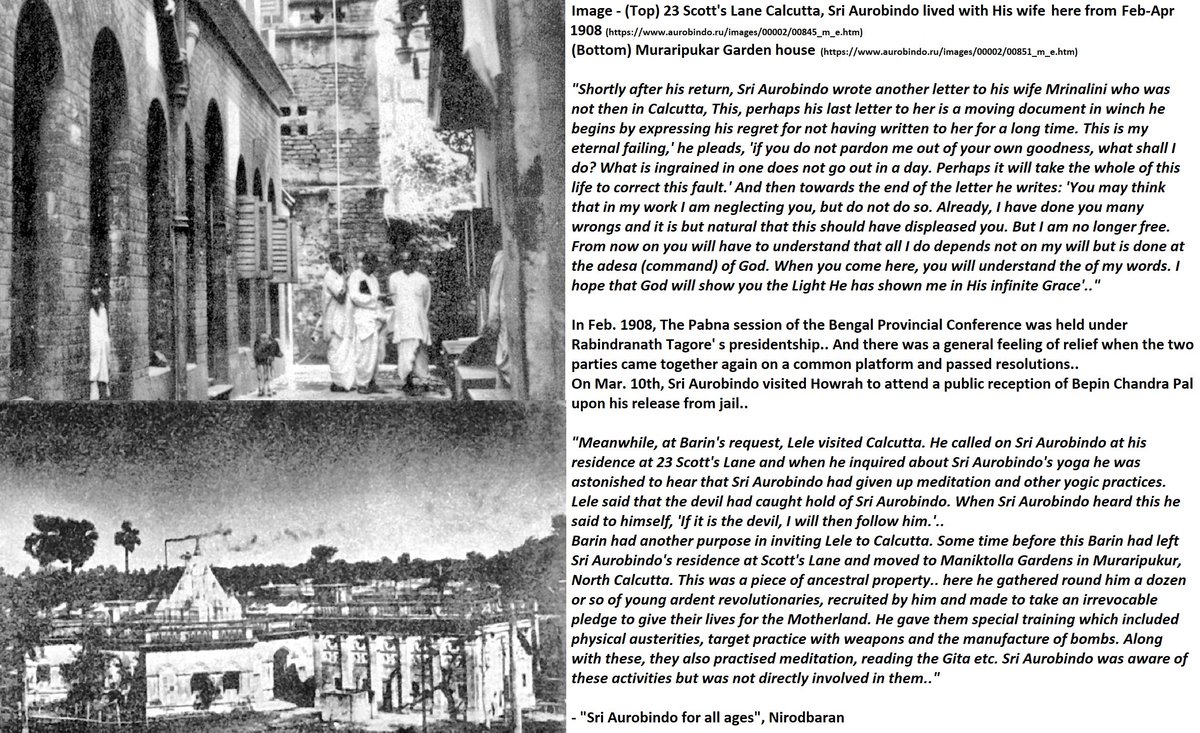
In Apr-1908, #SriAurobindo gave a few speeches in Bengal while working on Bande-Mataram. He also changed his residence to 48 Grey St. at just the right time.
B/c the young revolutionaries were planning something drastic:
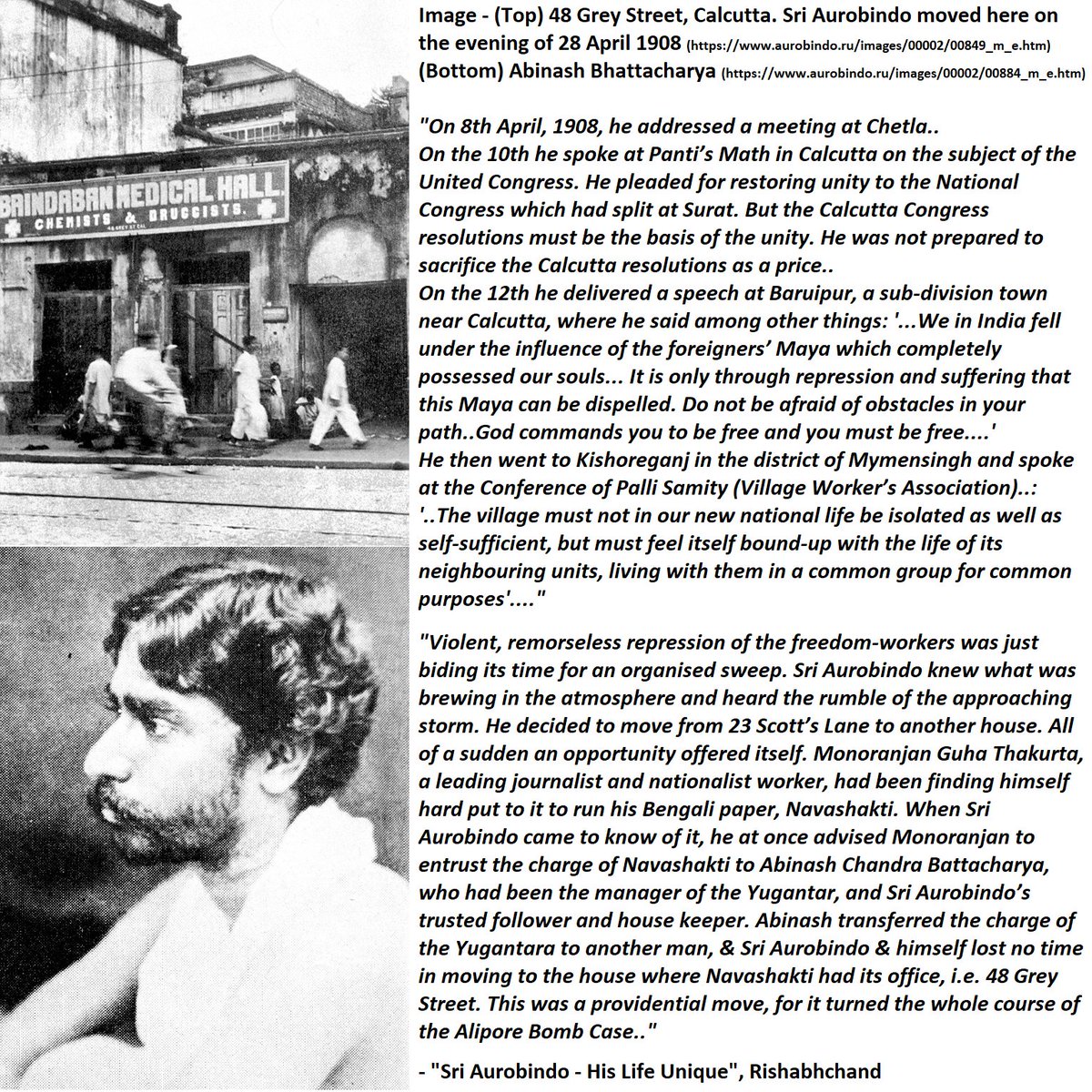
On Apr 30, 1908 Prafull & Khudiram threw a bomb in Muzaffarpur, targeting the then Magistrate - in the process killing two.
On May 02, 1908, #SriAurobindo was arrested..
What was to be a severe punishment turned for Him into a spiritual retreat:
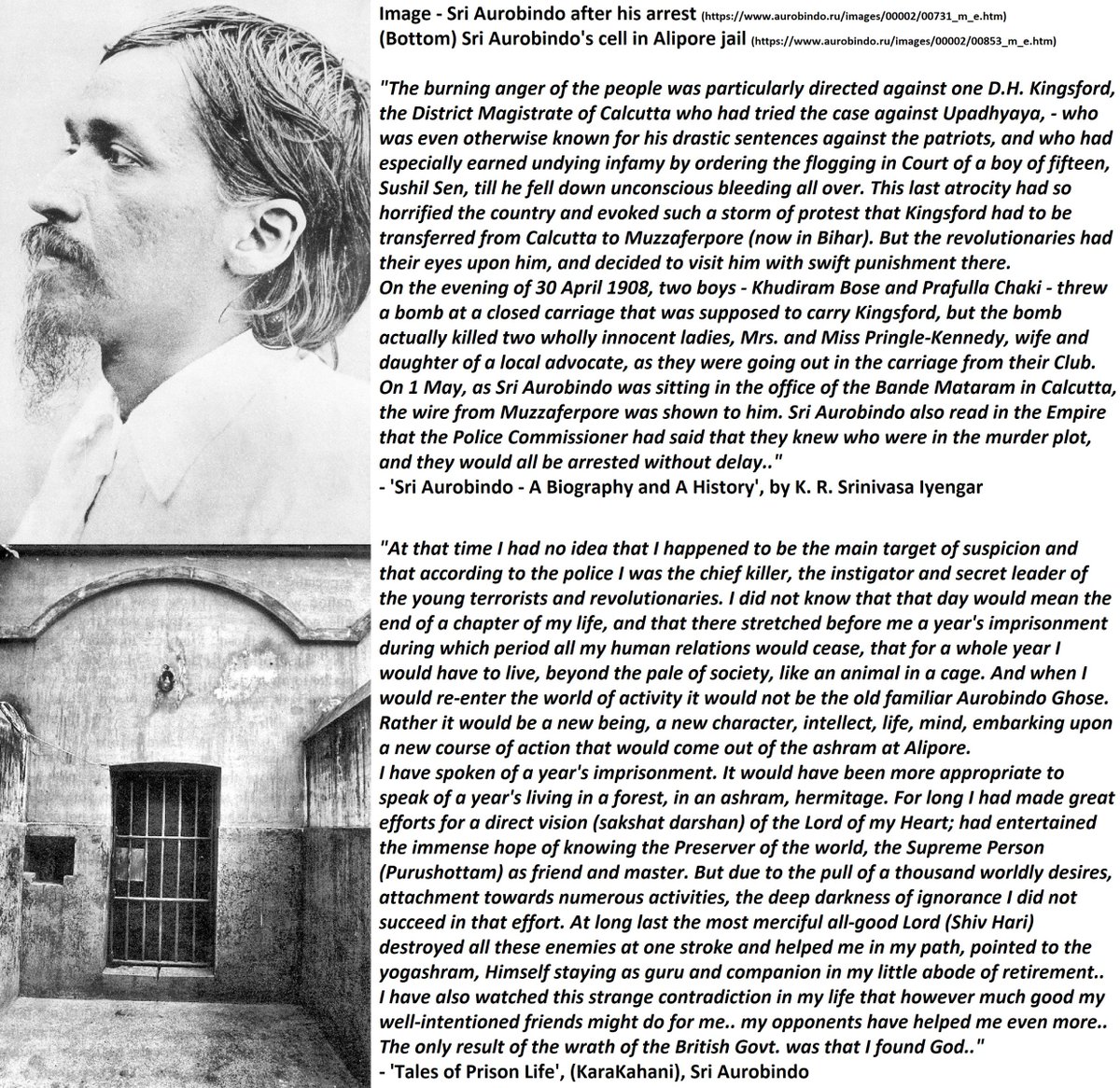
After initial trial in May-Sep, a hearing began in Oct at the court of Mr. Beachcroft, #SriAurobindo's fellow scholar at Cambridge
Sri Aurobindo, who was taken to Alipore jail on 5 May 1908, was acquitted exactly a year later, on 6 May 1909!:
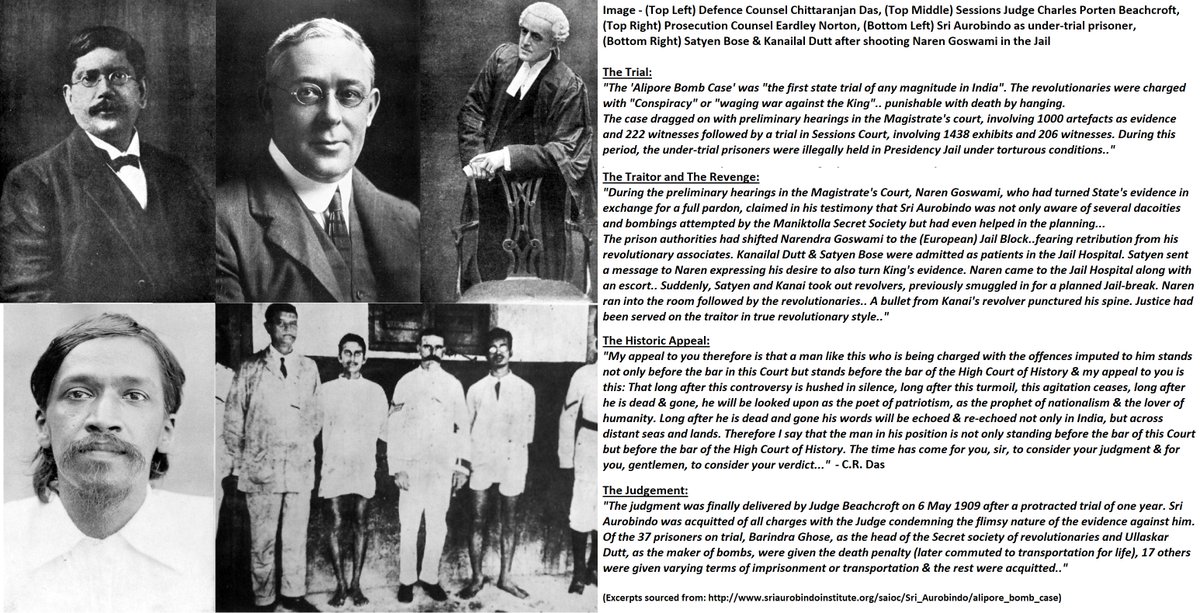
After His release, #SriAurobindo moved to His maternal uncle's house. For the love that India poured on Him, He wrote an open letter to express His gratitude.
In May-Jun 1909, He gave two momentous speeches, at Uttarpara & at Beadon Square:
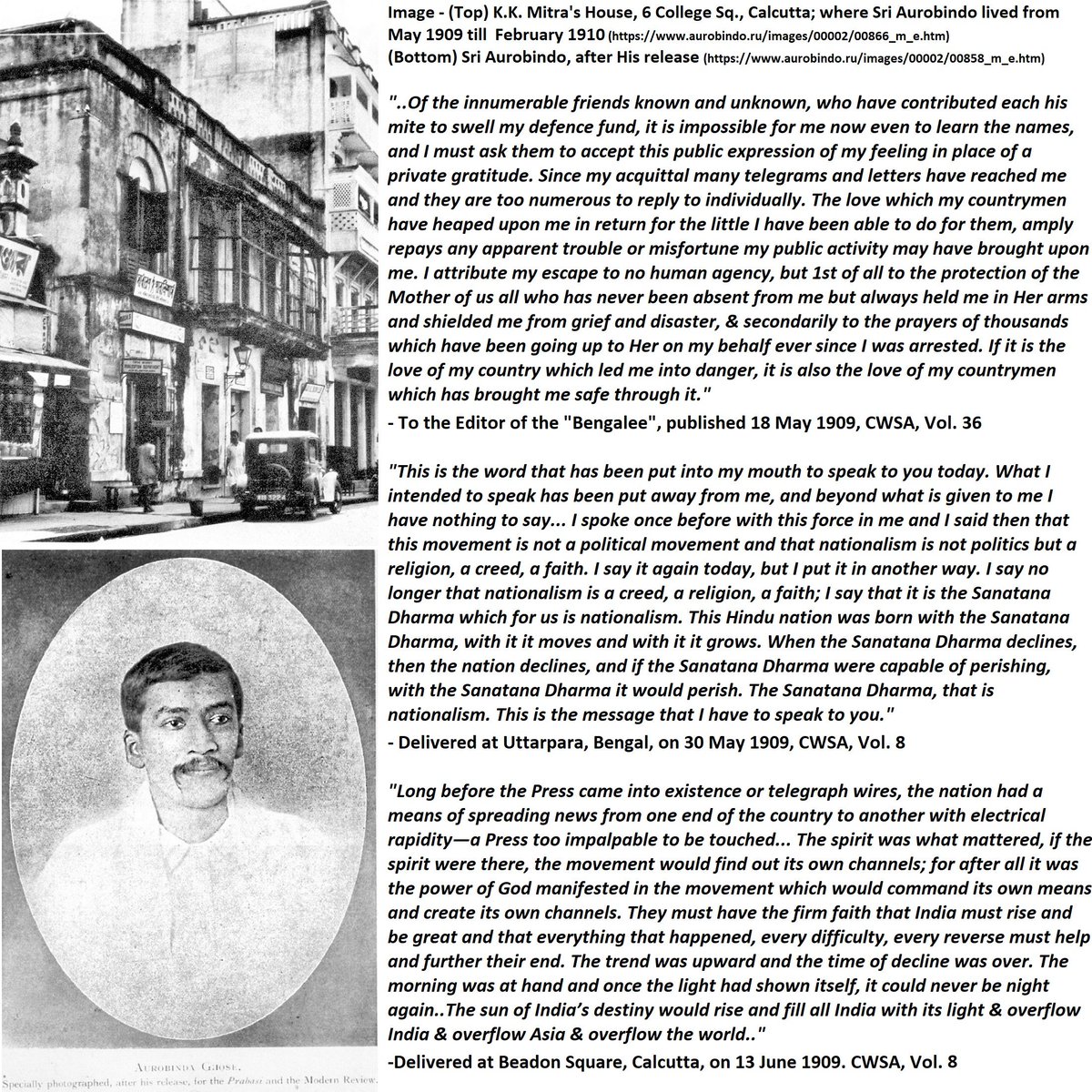
During #SriAurobindo's imprisonment, India's condition had gotten worse. Repressive laws of the Govt. led to close-down of Bande-Mataram & Yugantar, & jailing of Extremist leaders.
Sensing the change, Sri Aurobindo started a new paper:
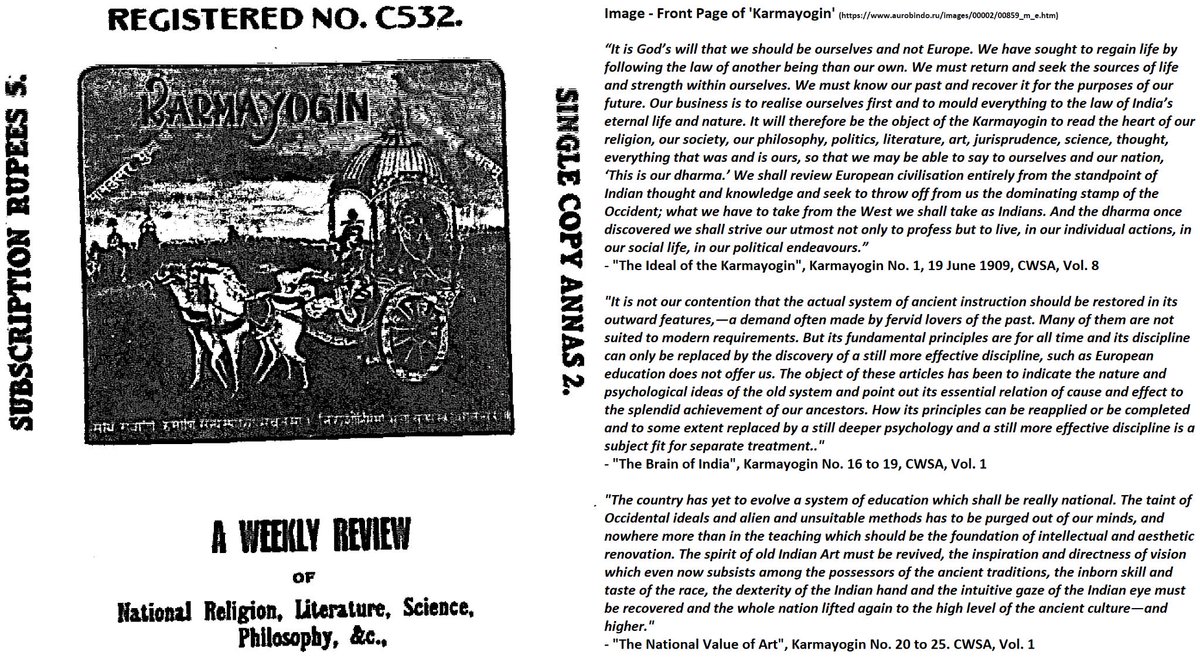
'Karmayogin' became a hit, with subscribers from all over India. As Nivedita wrote, "How I wish I could get a copy every week!..Aravindo is magnificent!"
#SriAurobindo's speeches at the time conveyed a major theme—Perseverance:
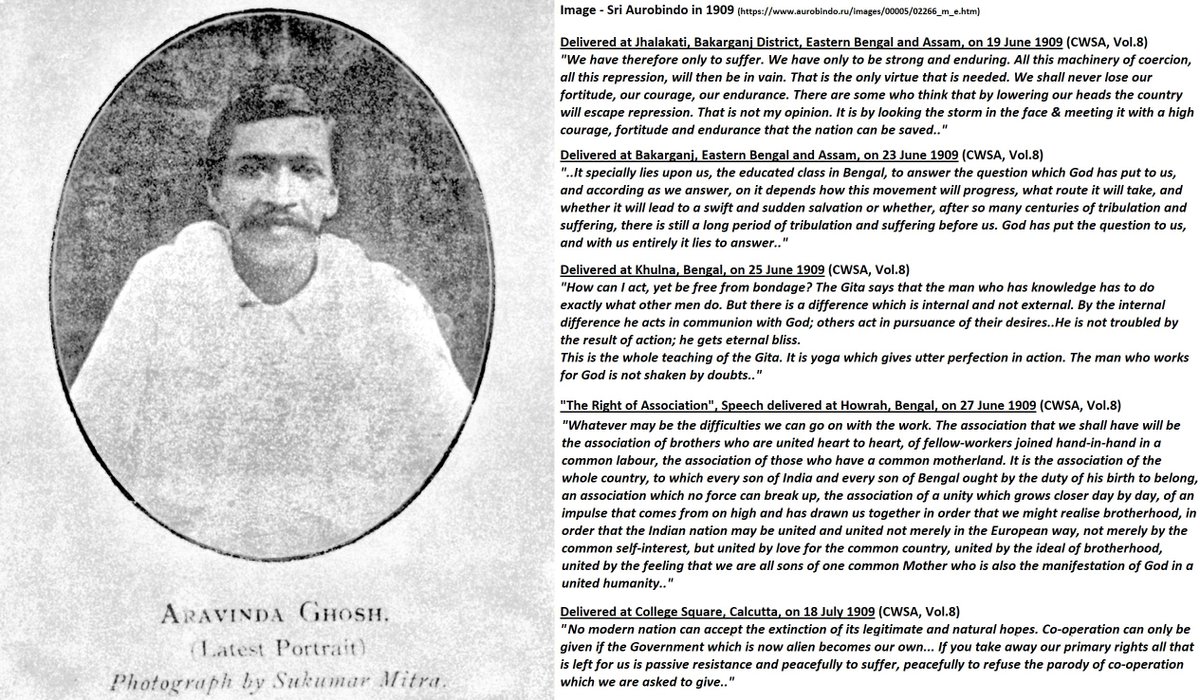
How could British Govt. digest the success of 'Karmayogin'? They started working on plans to deport #SriAurobindo, the one major hurdle in their path..
Sri Aurobindo wrote an open letter in response, & started a new Bengali weekly, 'ধর্ম':
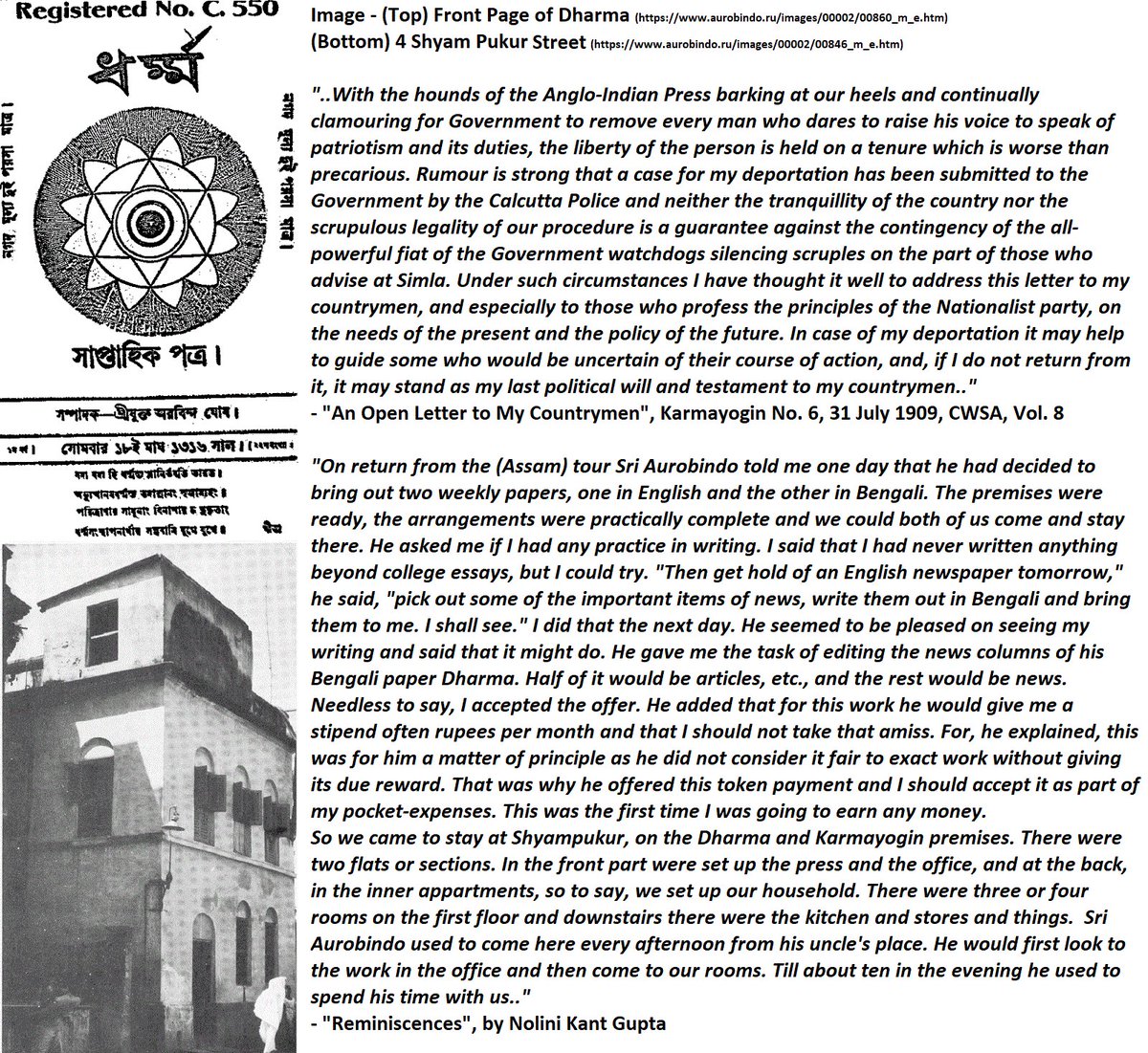
Even in His short political stint after Alipore, #SriAurobindo made so many valuable contributions to the cause of 'Swaraj' with His political interventions
His actions remarkably combined 2 often opposite traits: steadfastness & statesmanship:
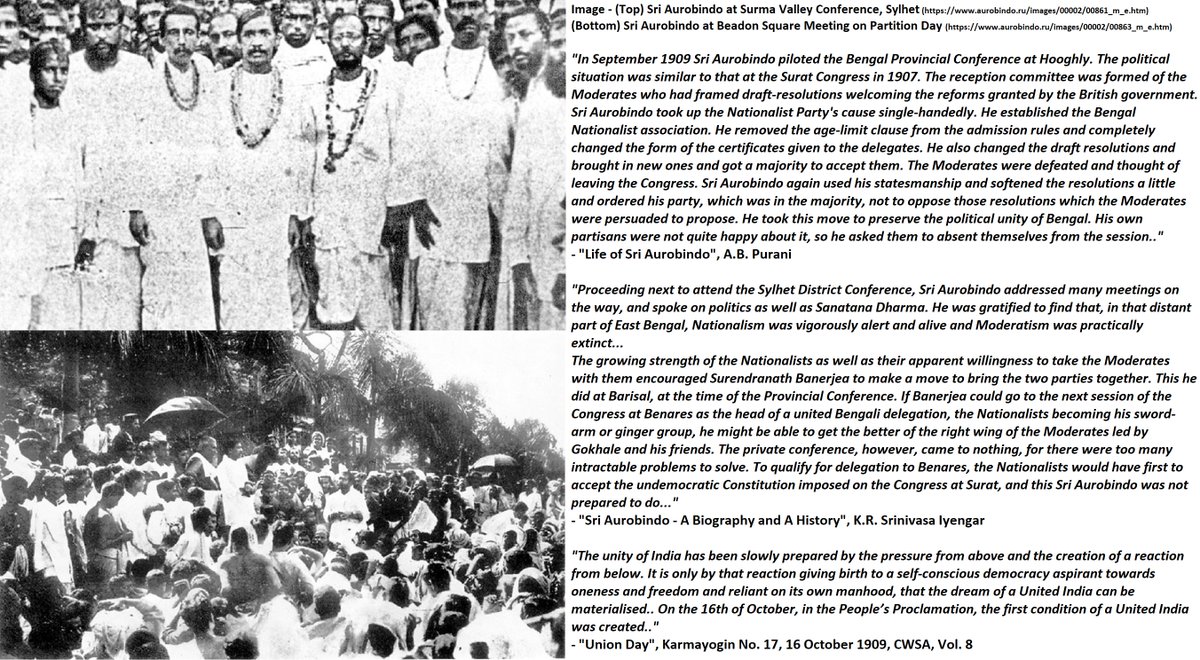
Morley-Minto reforms had been introduced, & #SriAurobindo saw through the facade. He wrote a 2nd letter to His countrymen, & Govt. started the proceedings for His arrest.
But it wasn't the command of Govt. which He followed, but that of God:
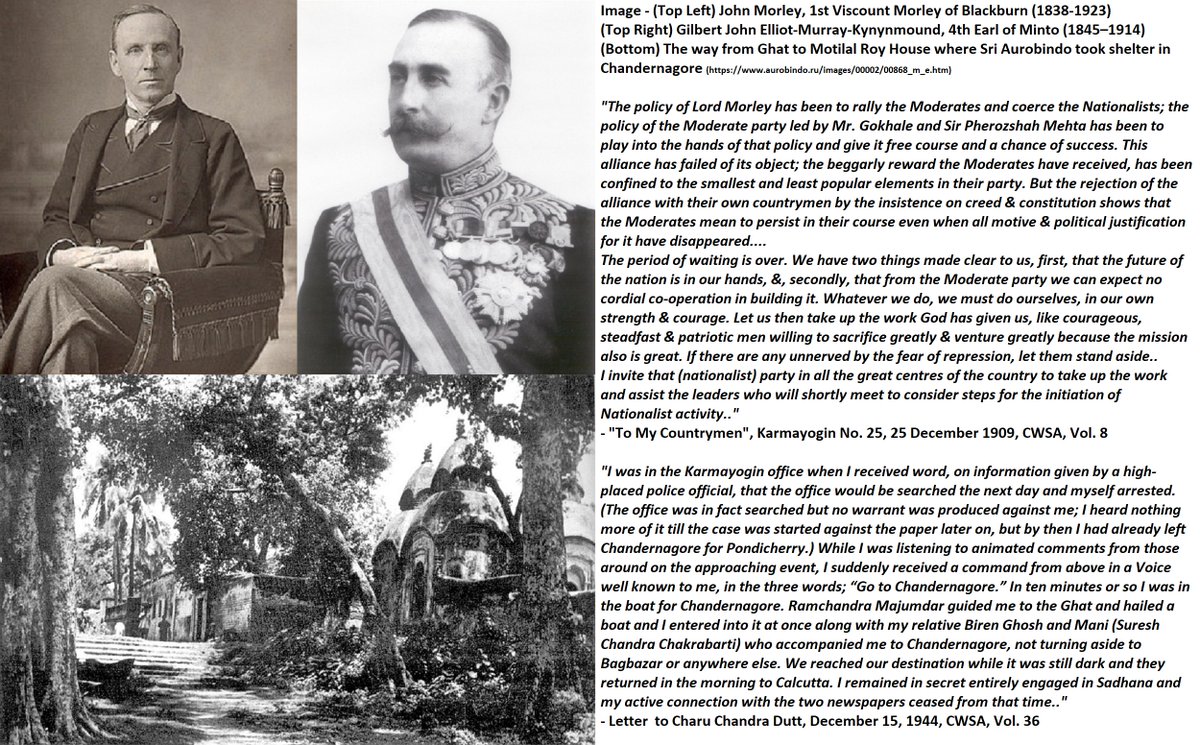
#SriAurobindo stayed in Chandernagore till 31 Mar, His sadhana continuing amidst the turmoil.
On receiving the 2nd command He reached Calcutta on 01 Apr, from there He sailed to Pondicherry, the Grace protecting Him all the while:
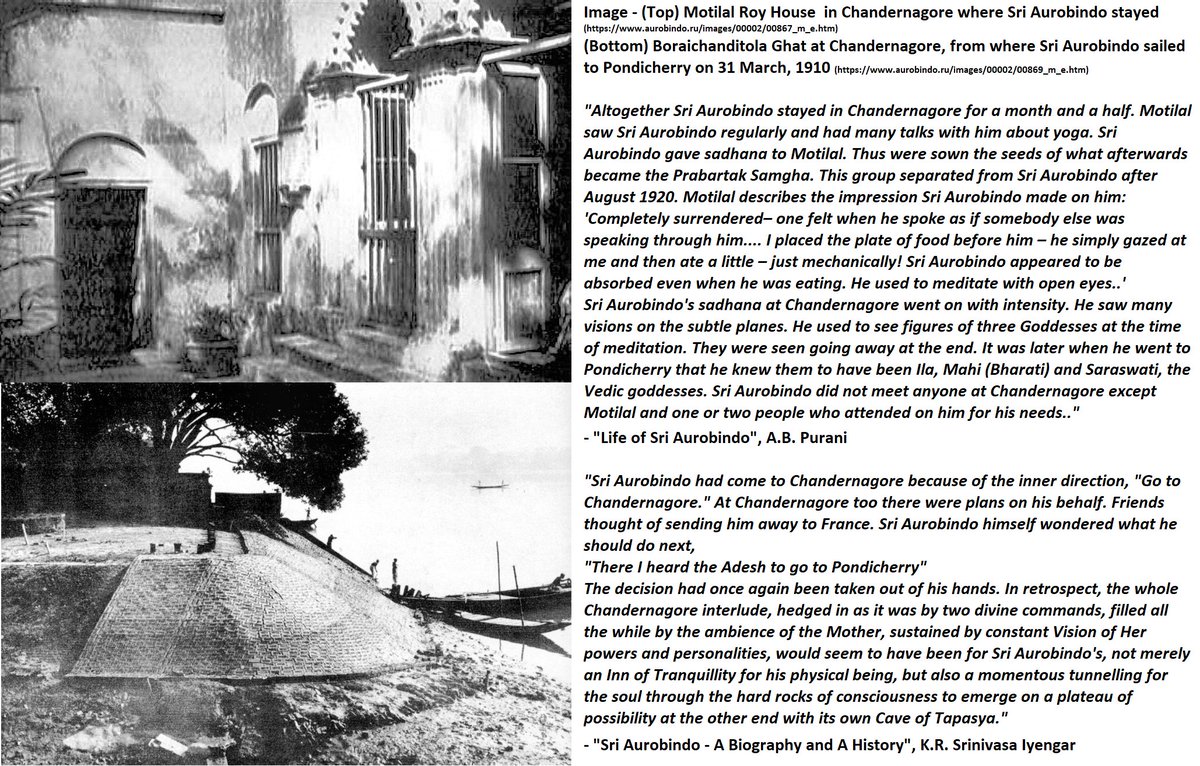
On this day, exactly 109 years ago, #SriAurobindo arrived at the seat of His sadhana.
"As if one who arrived out of infinity’s womb
He came new-born, infant & limitless
& grew in the wisdom of the timeless Child;
He was a vast that soon became a Sun."
(End)
